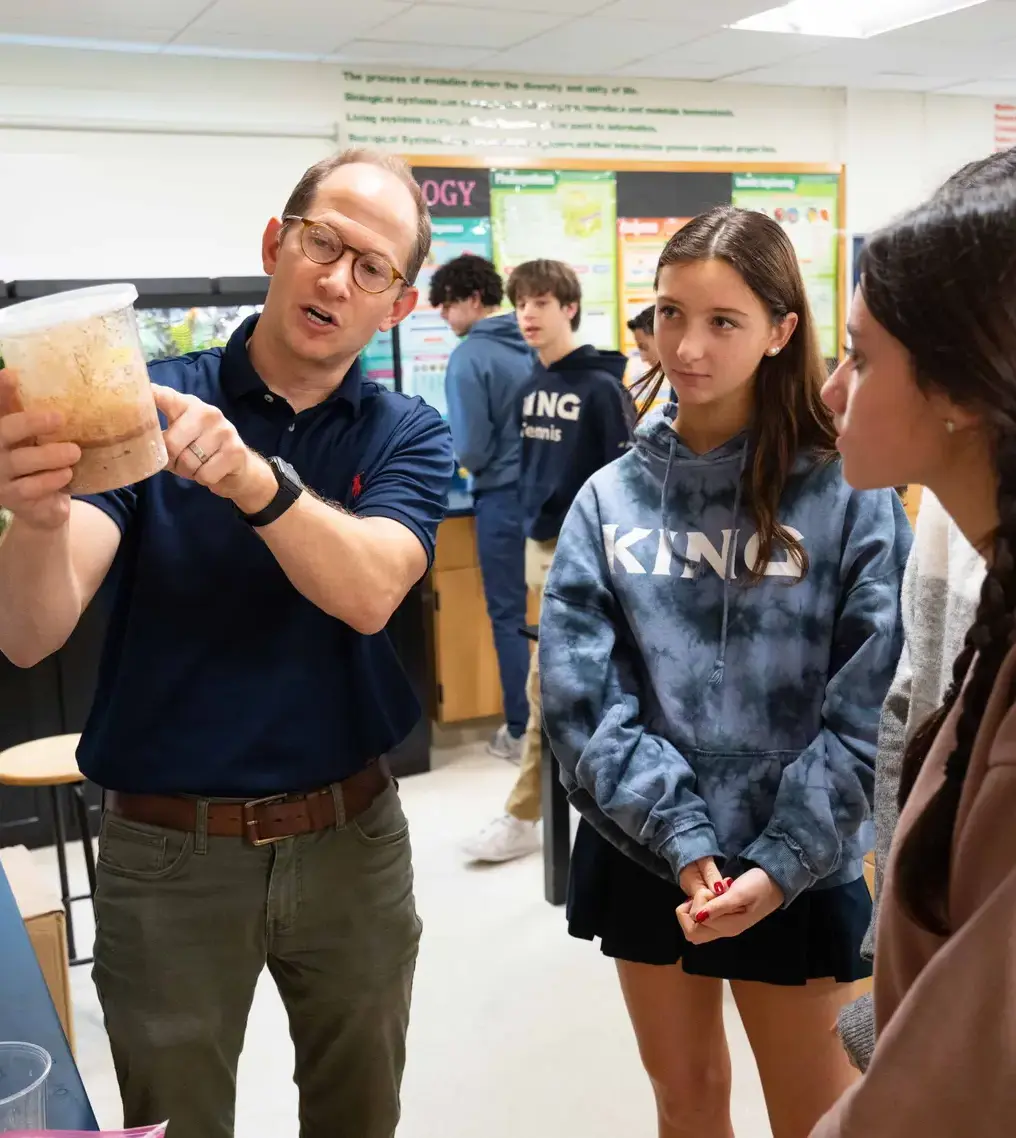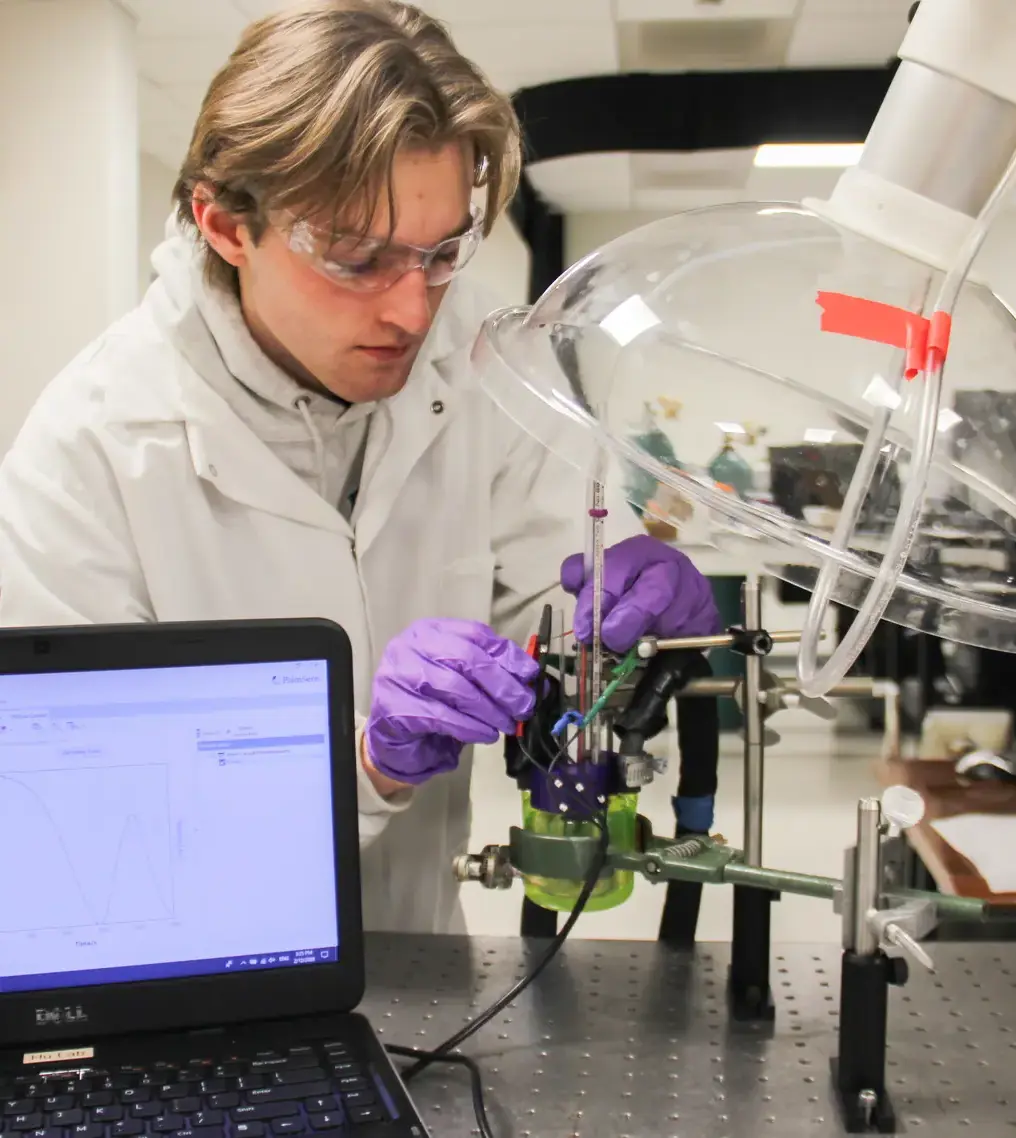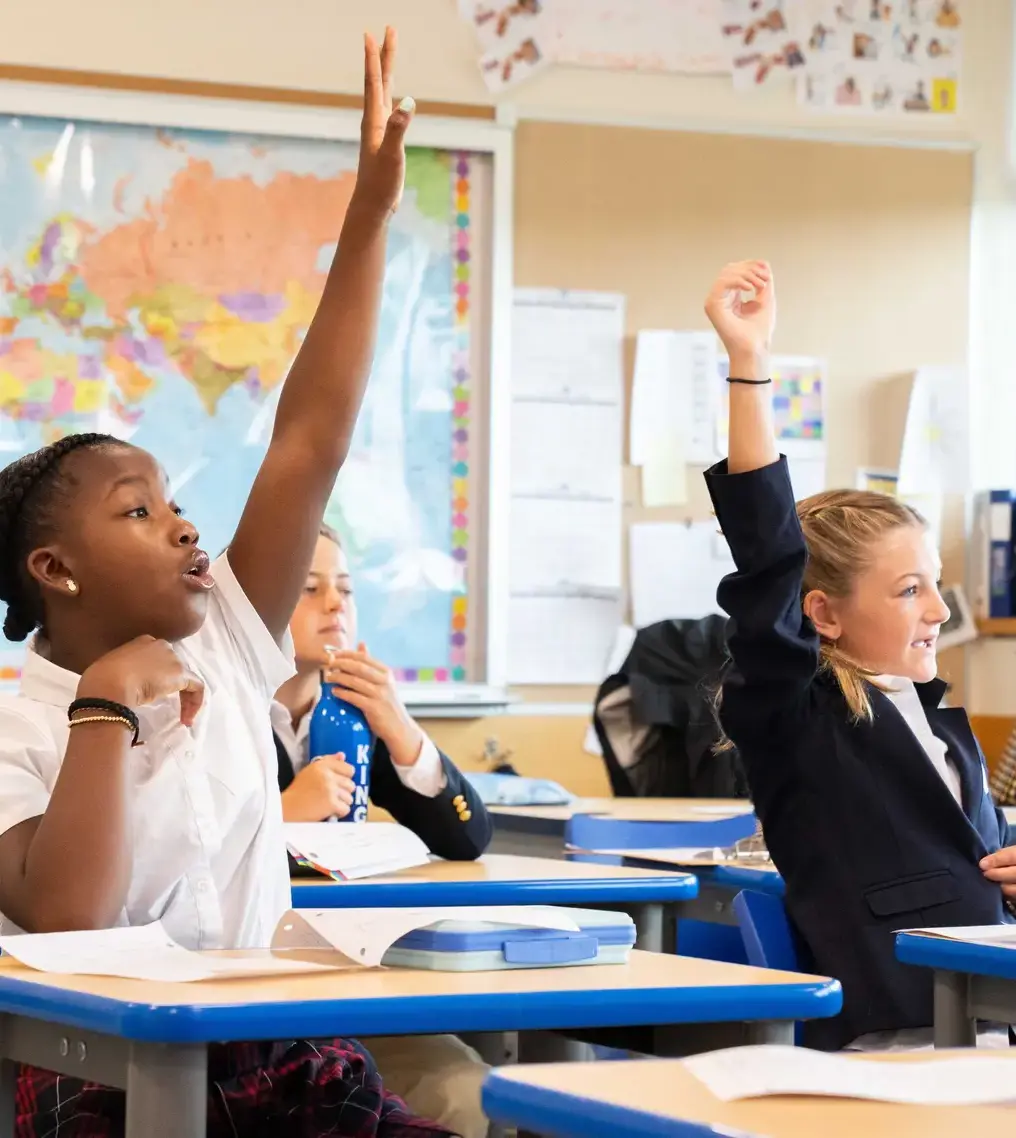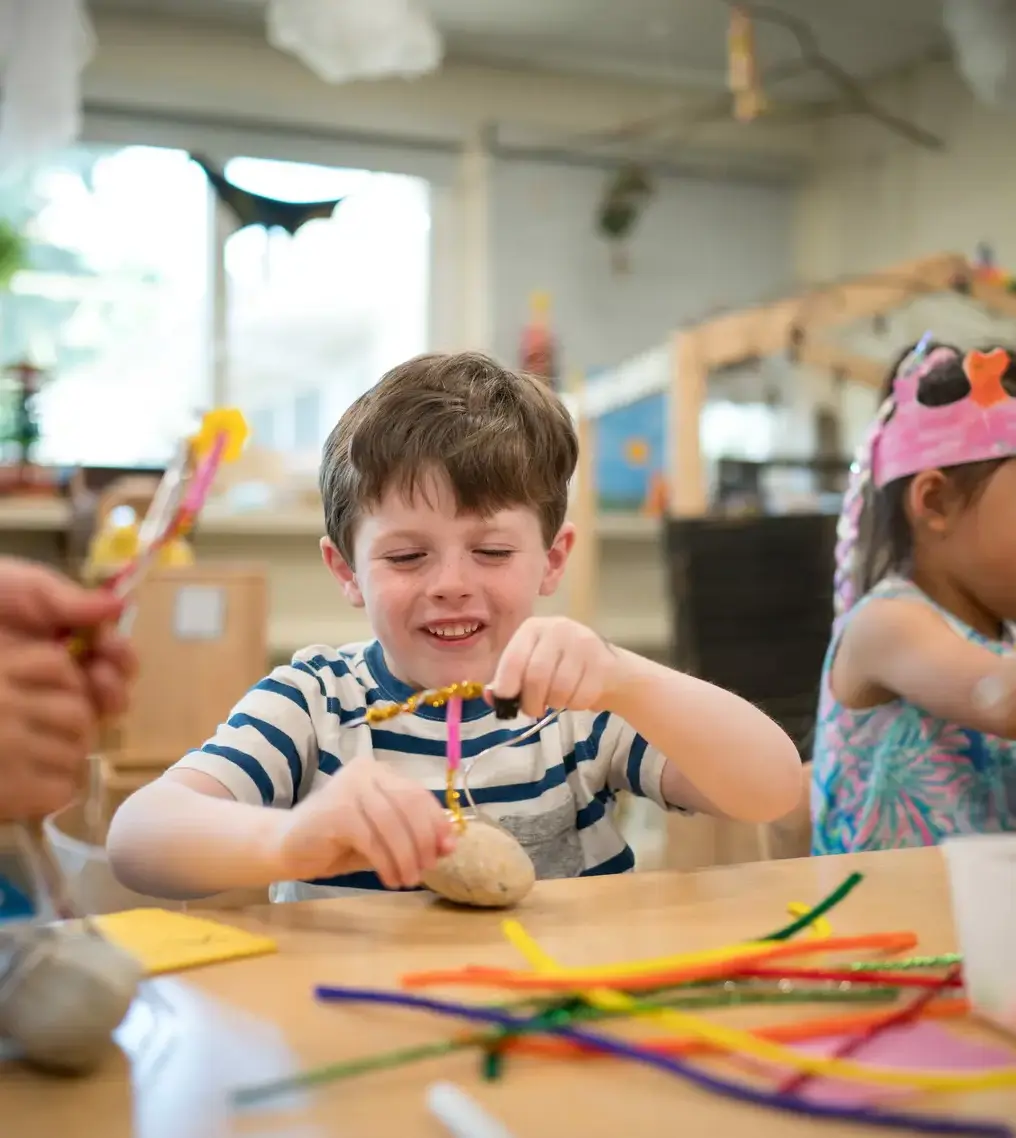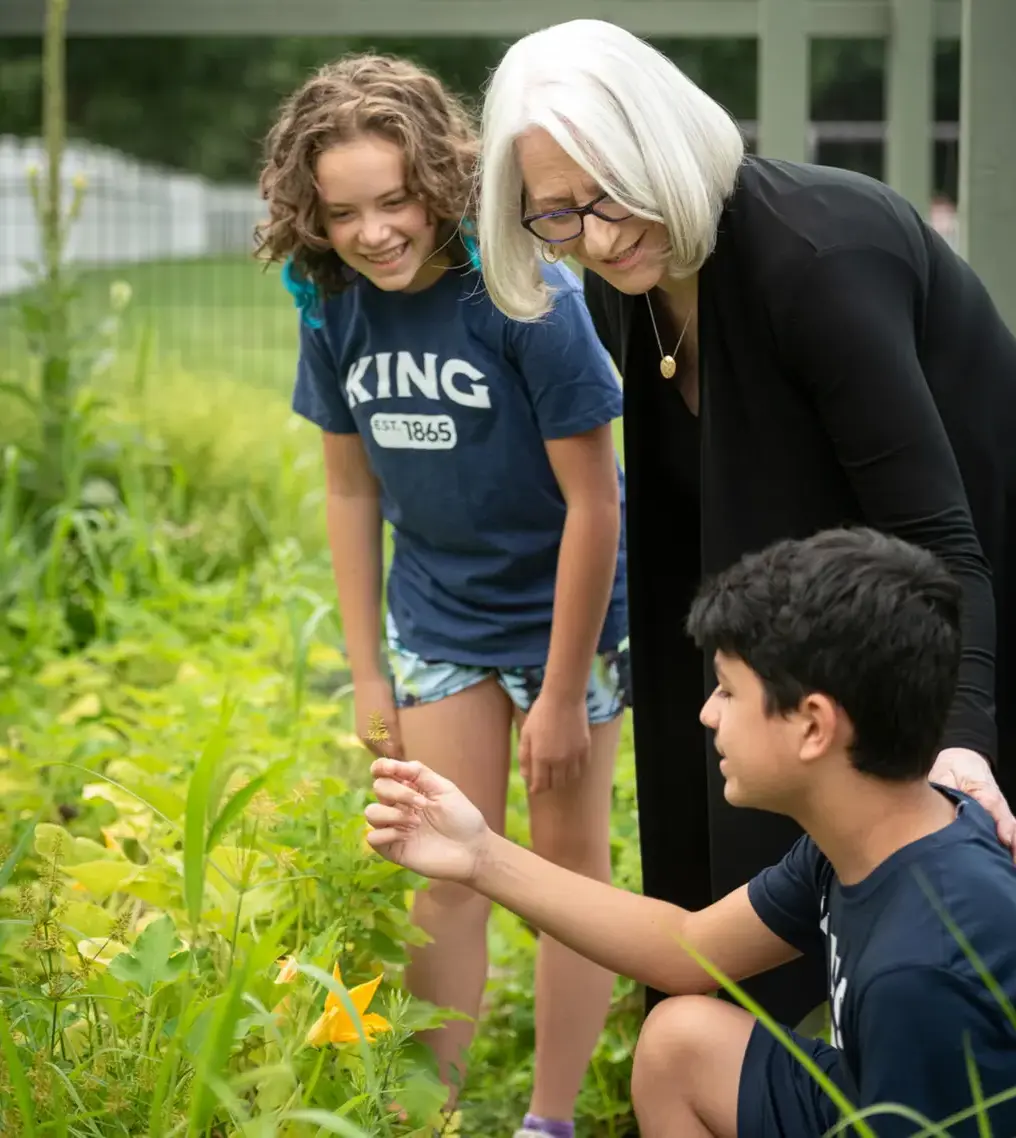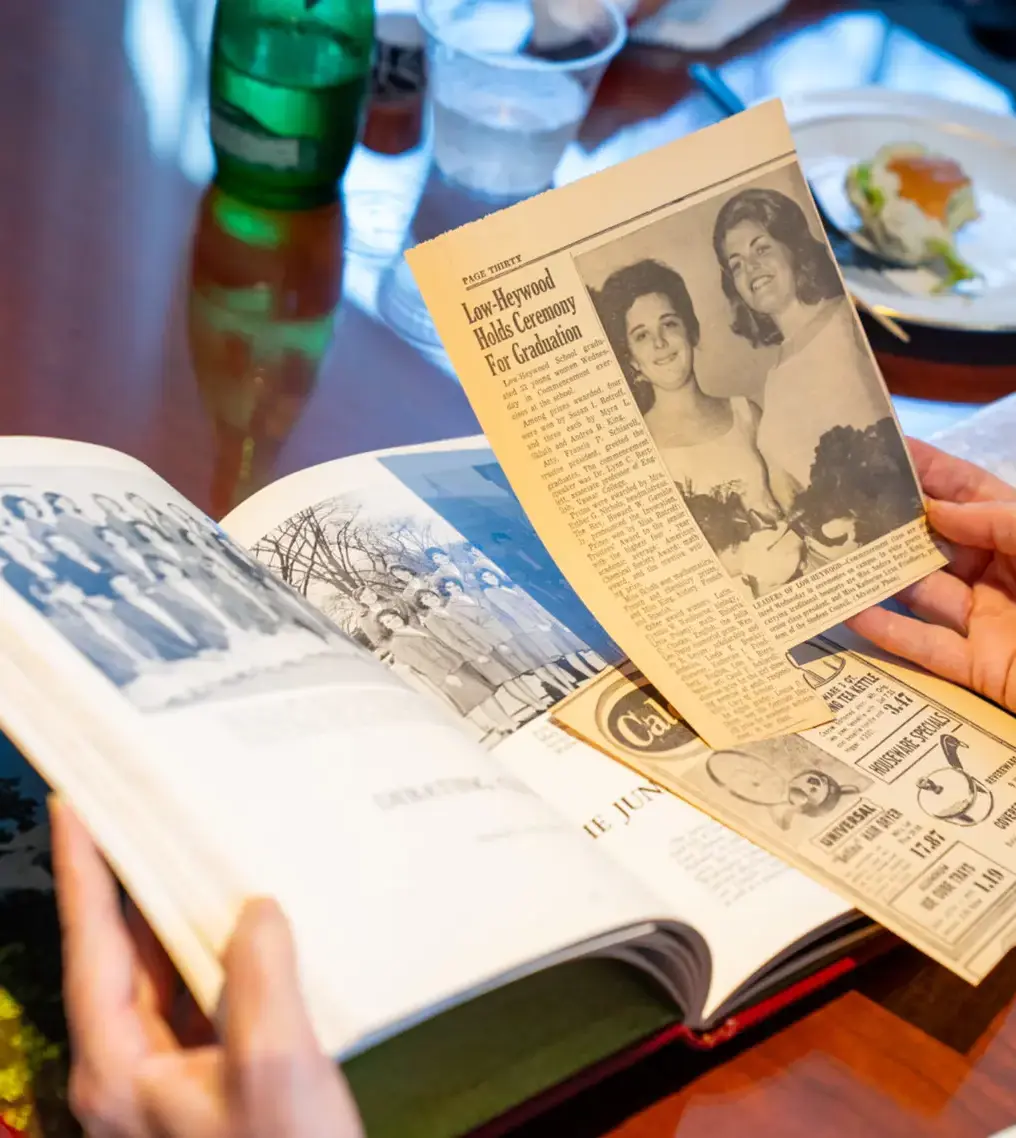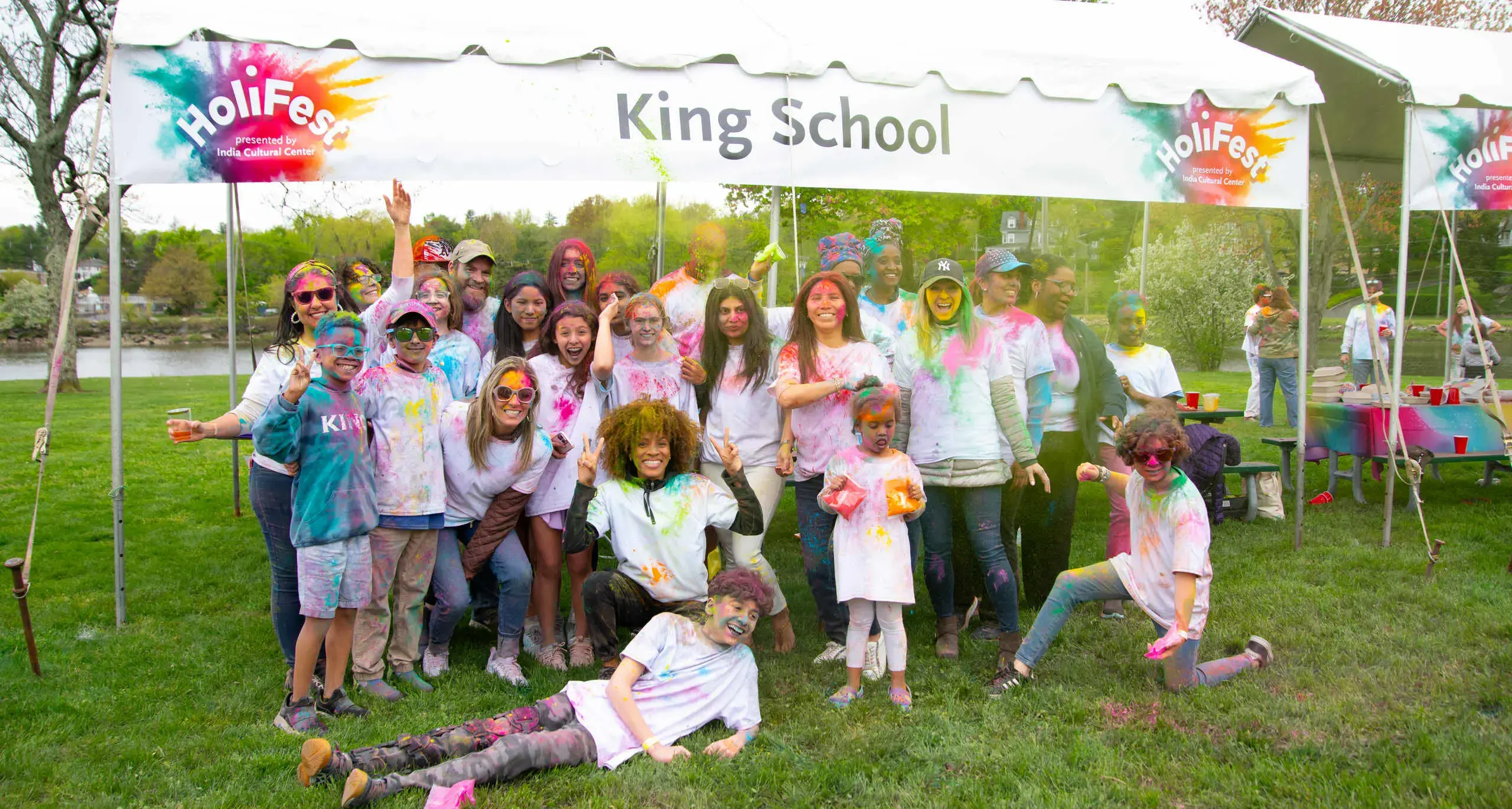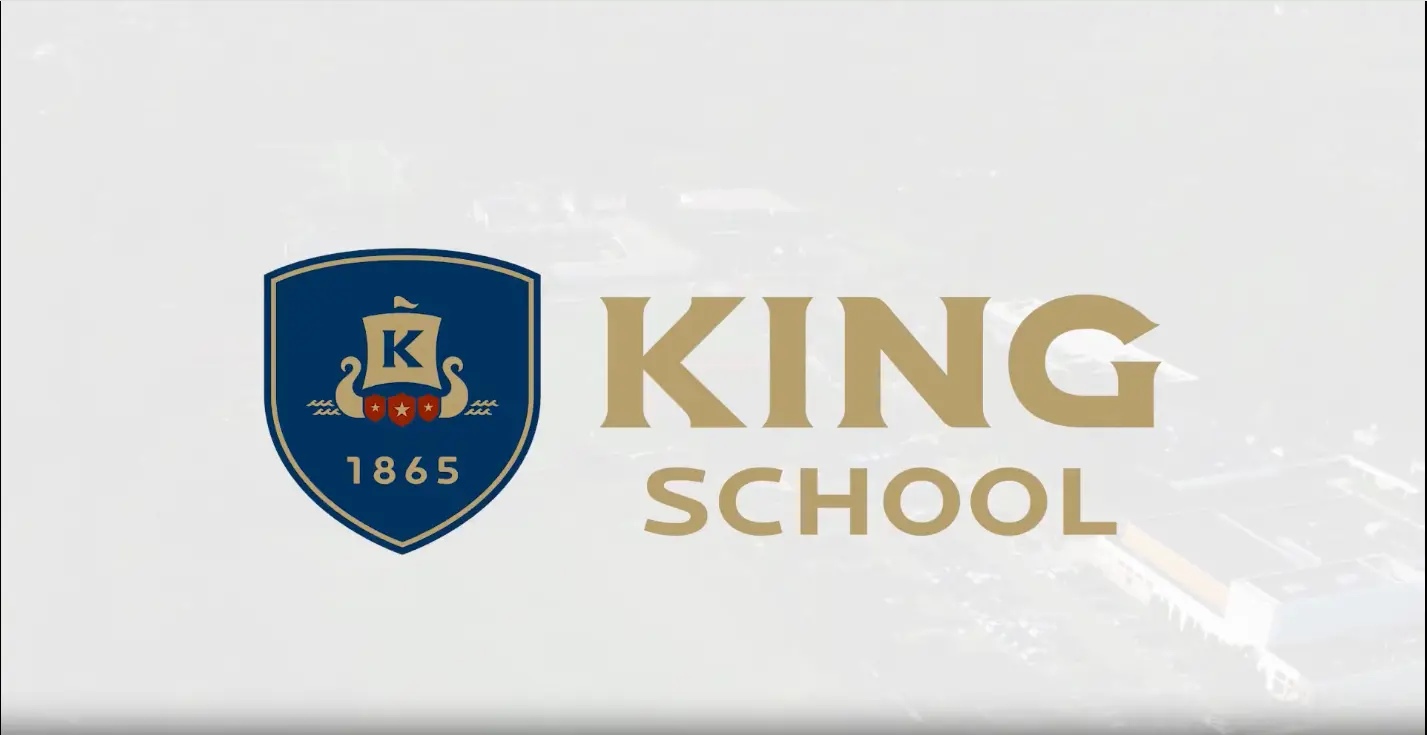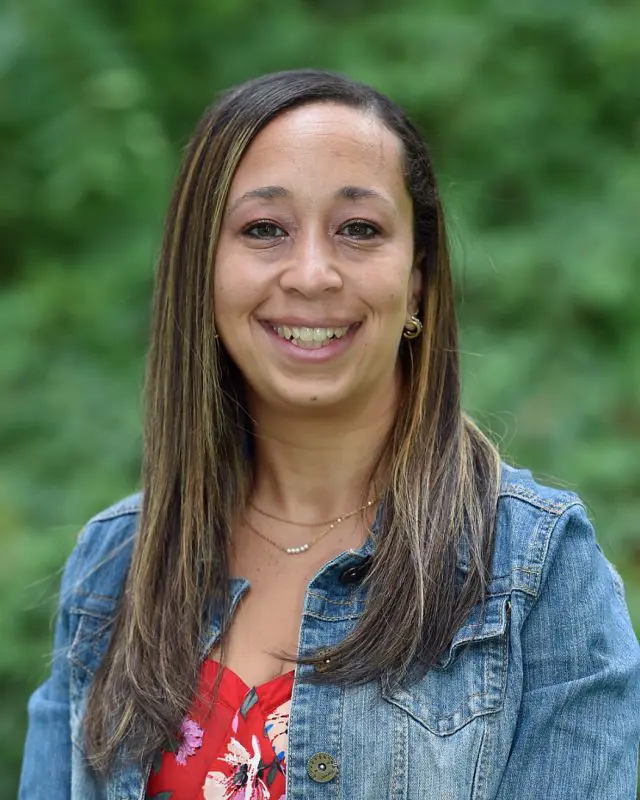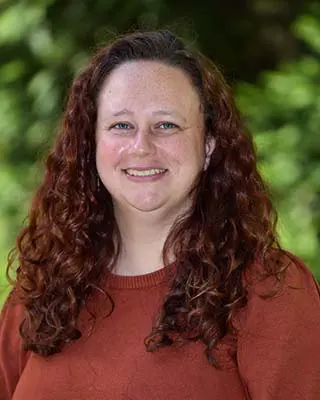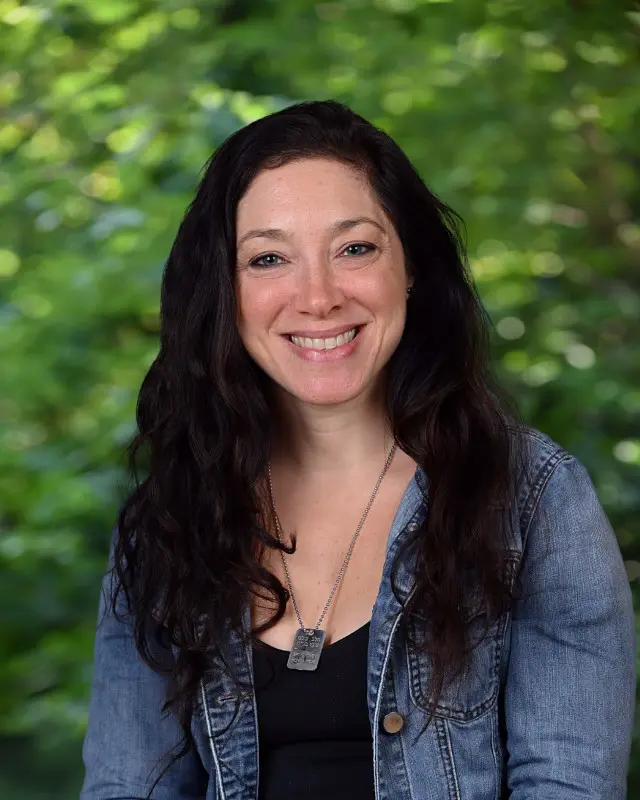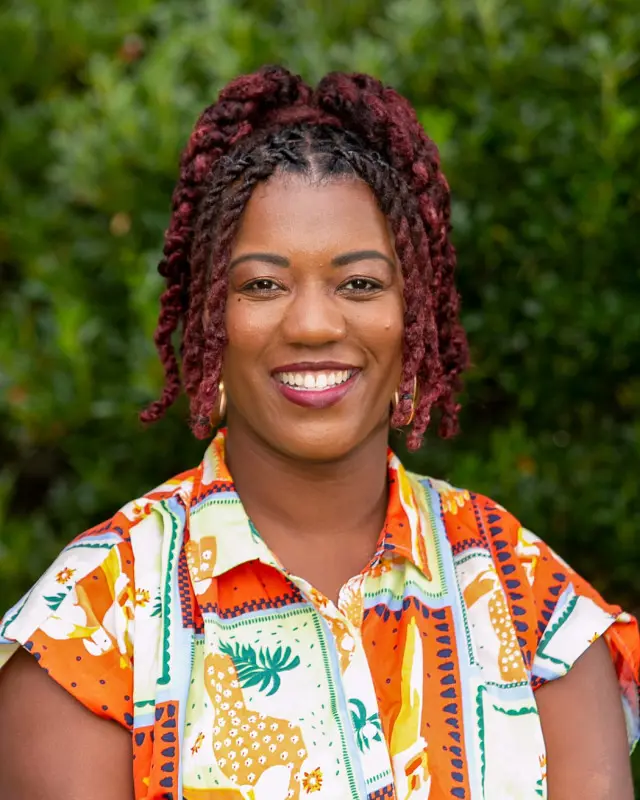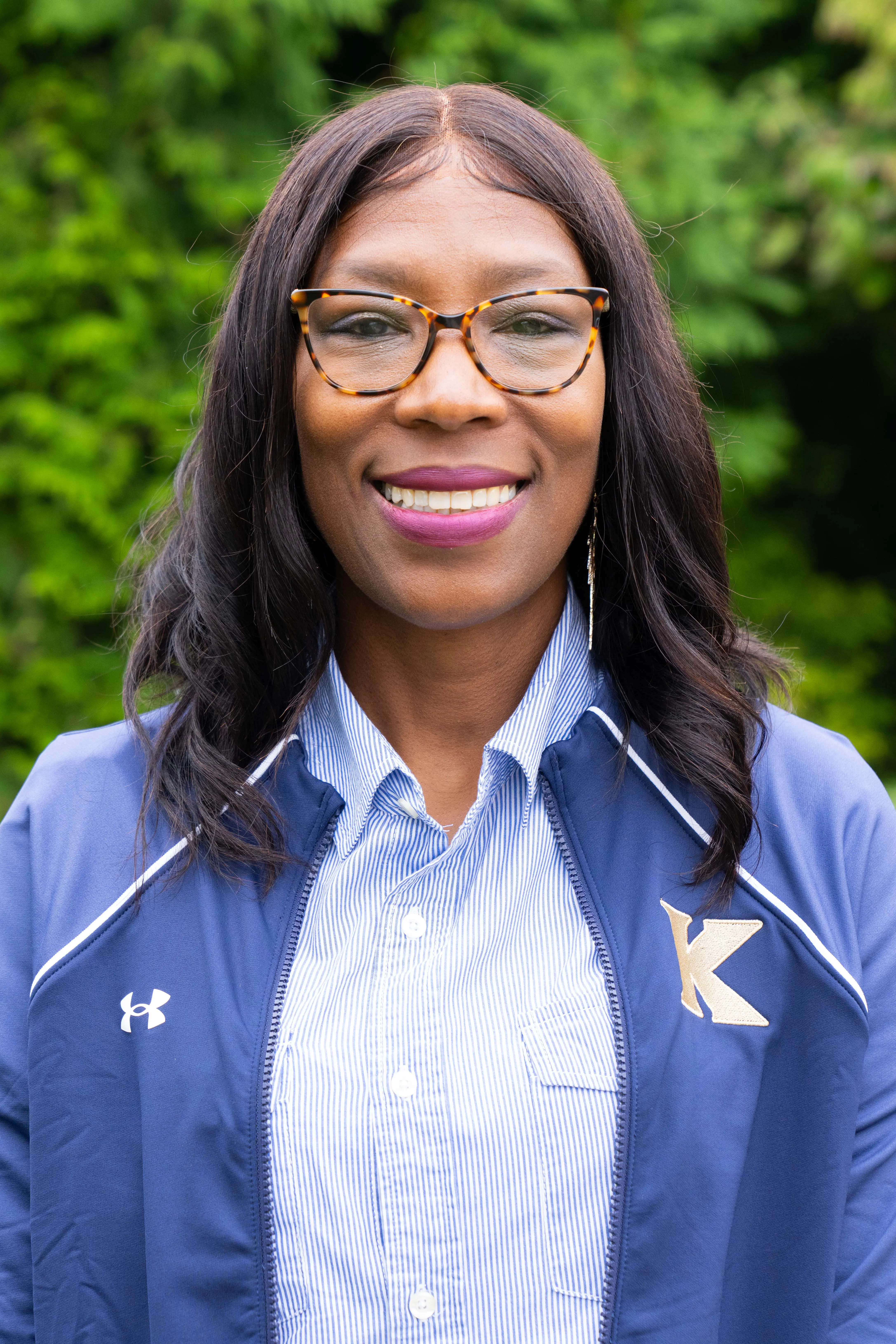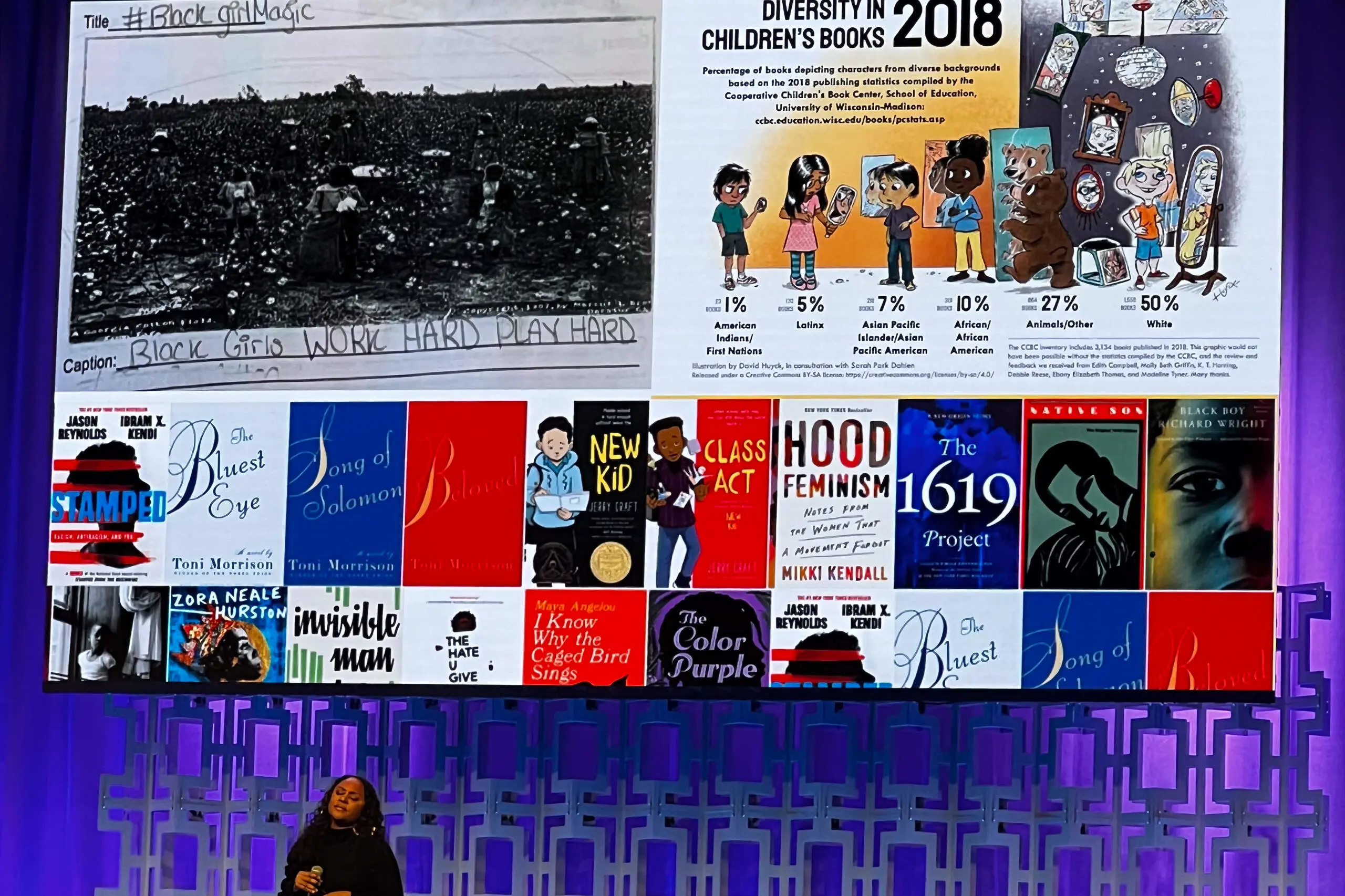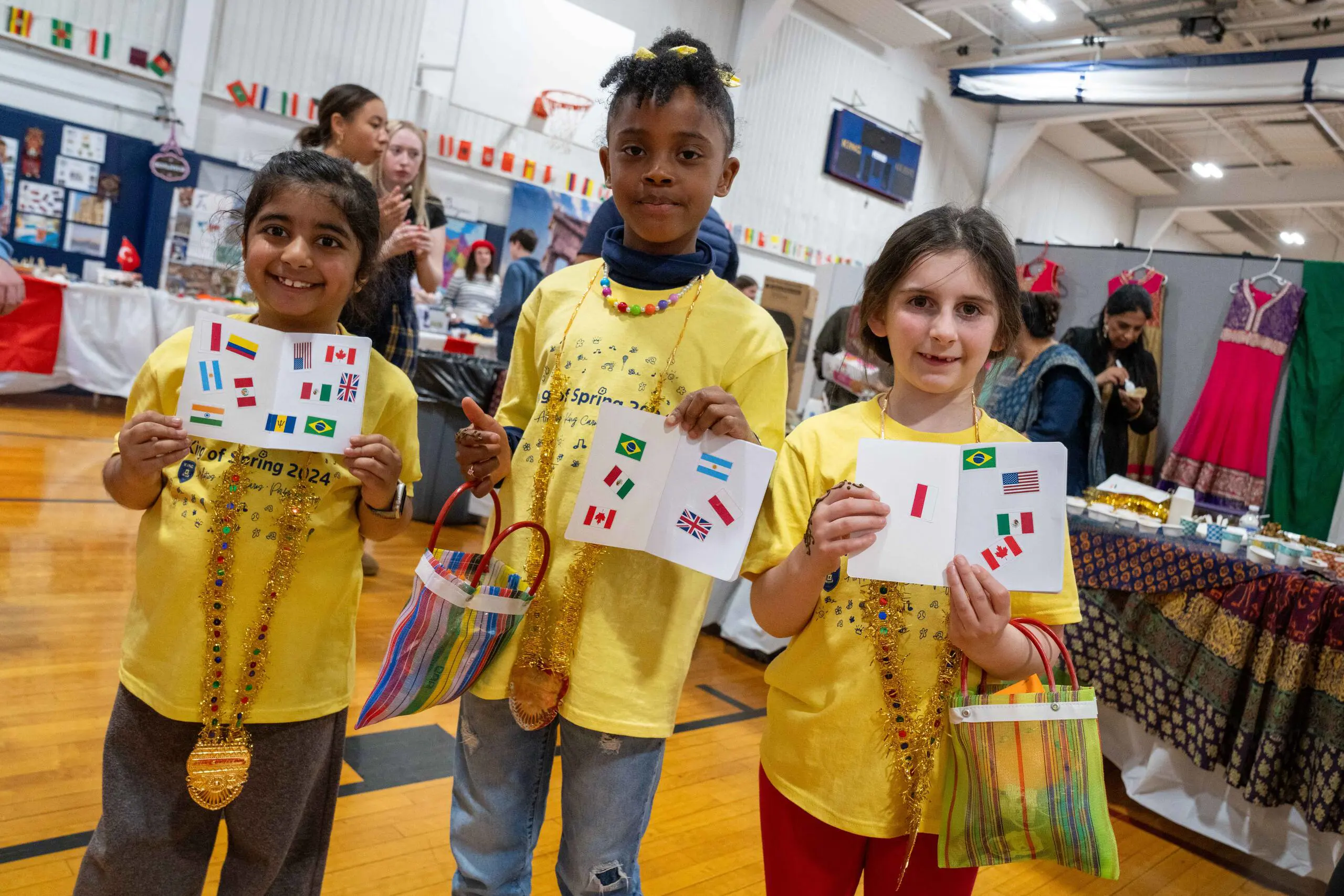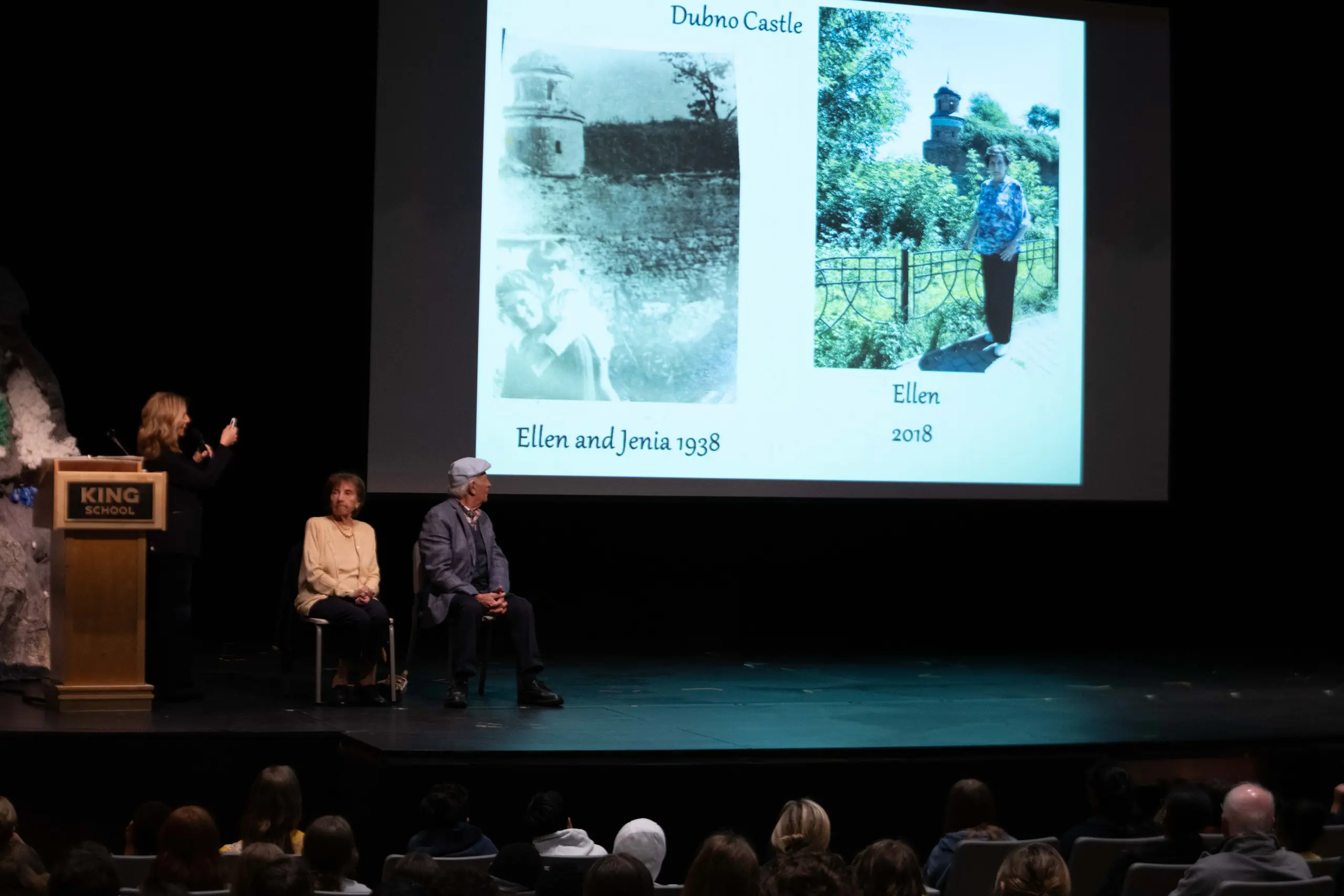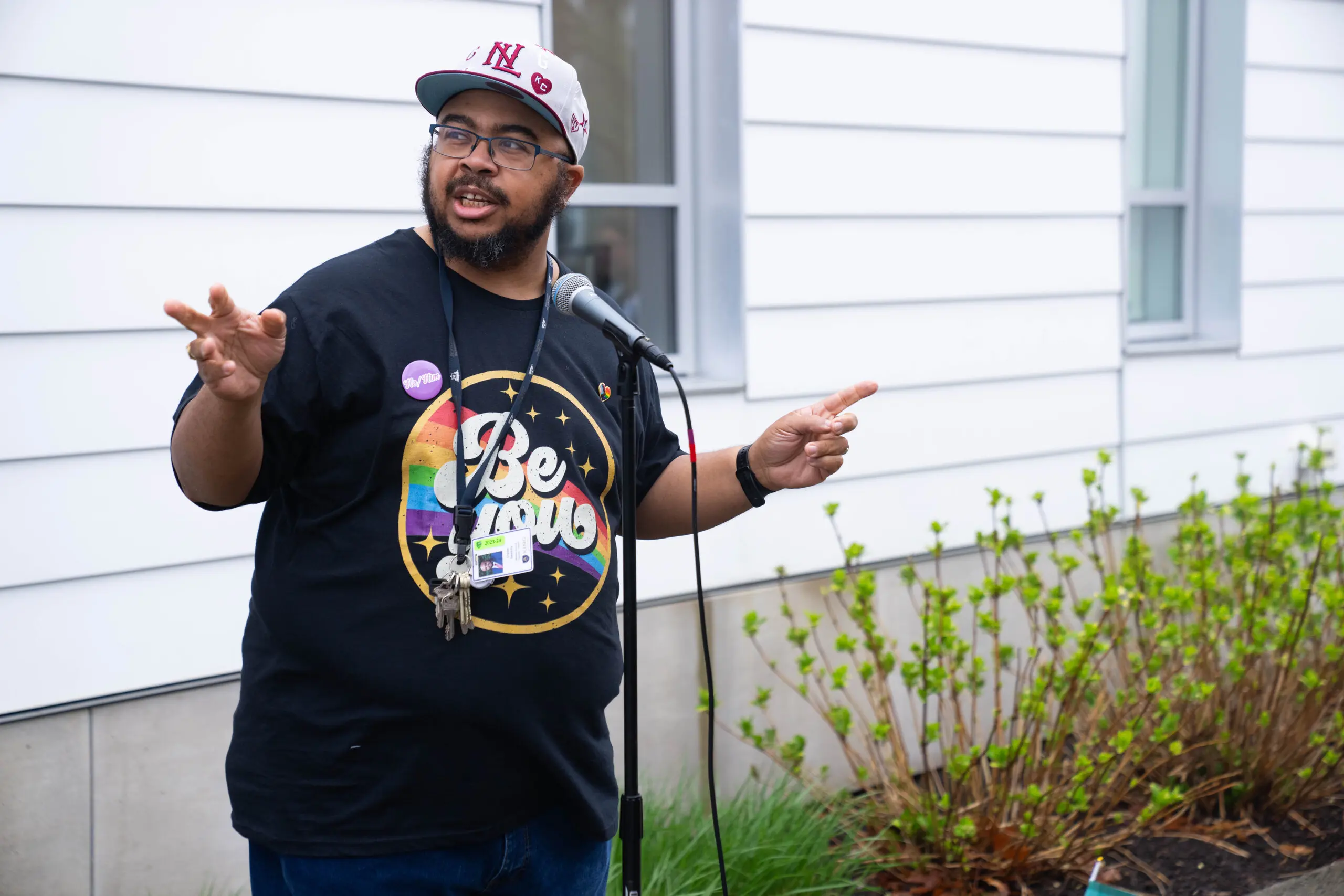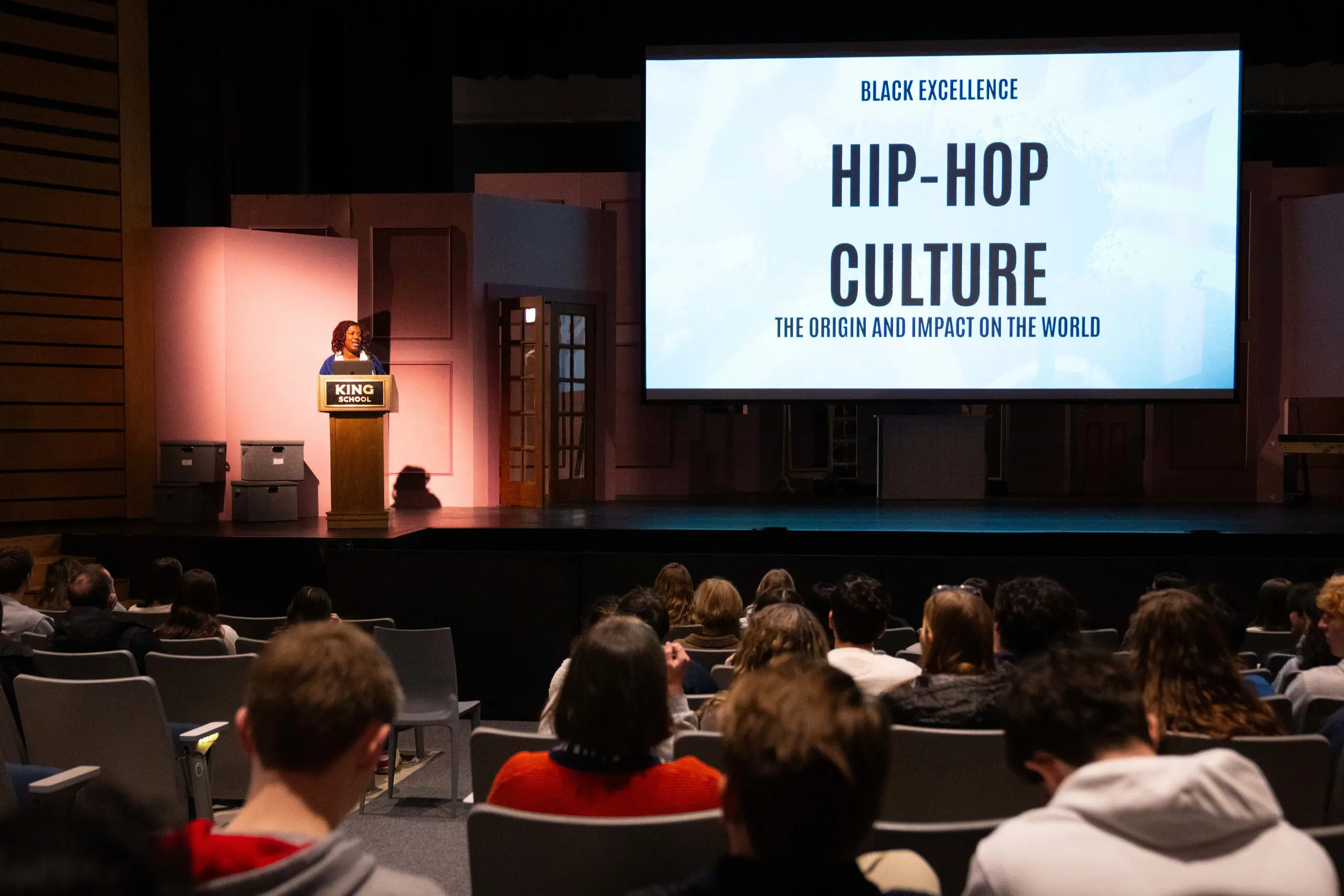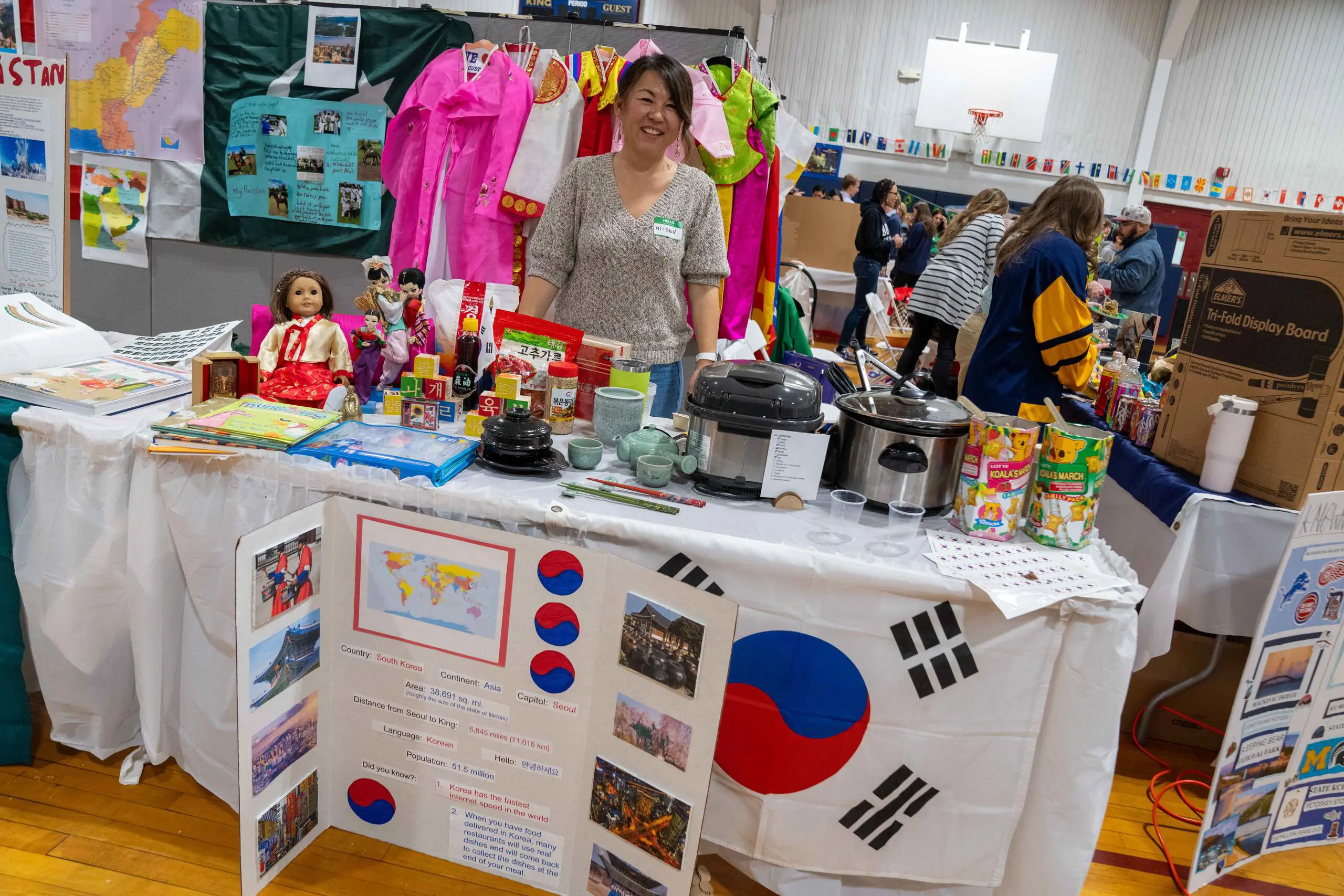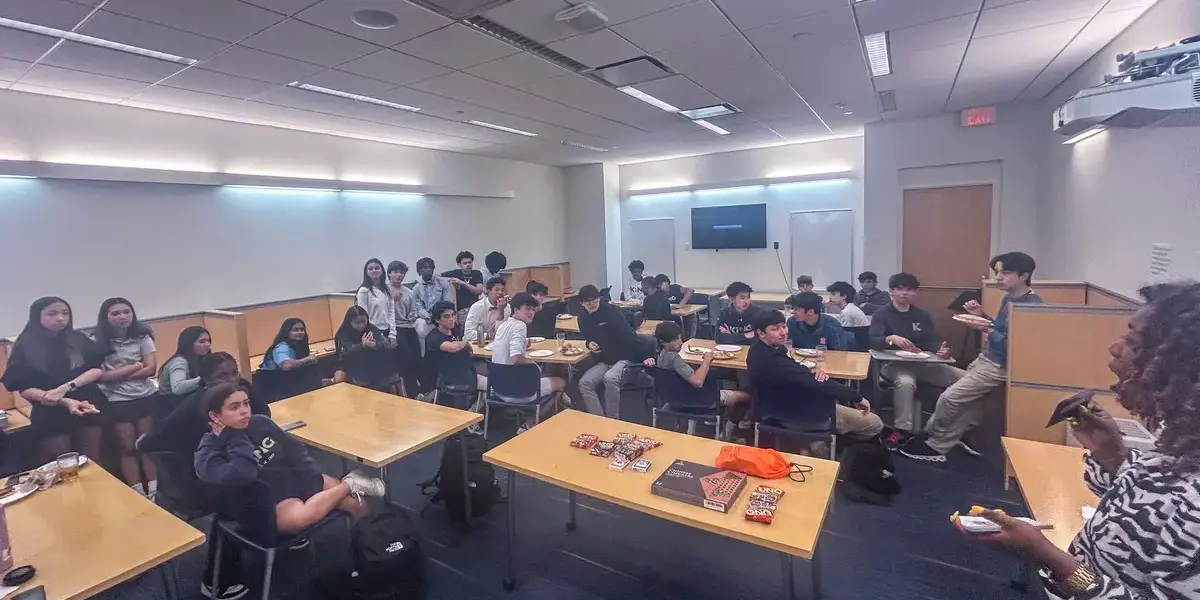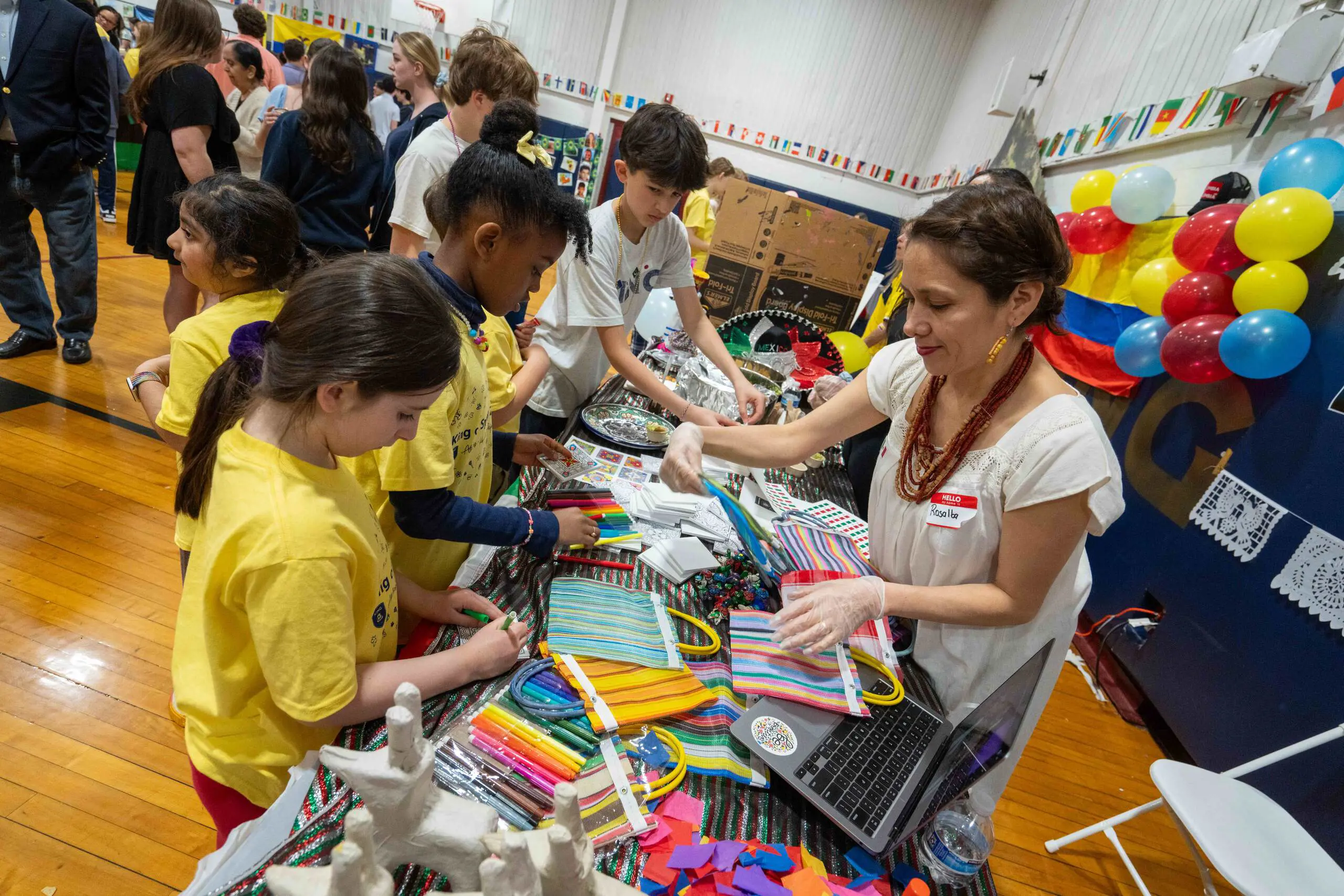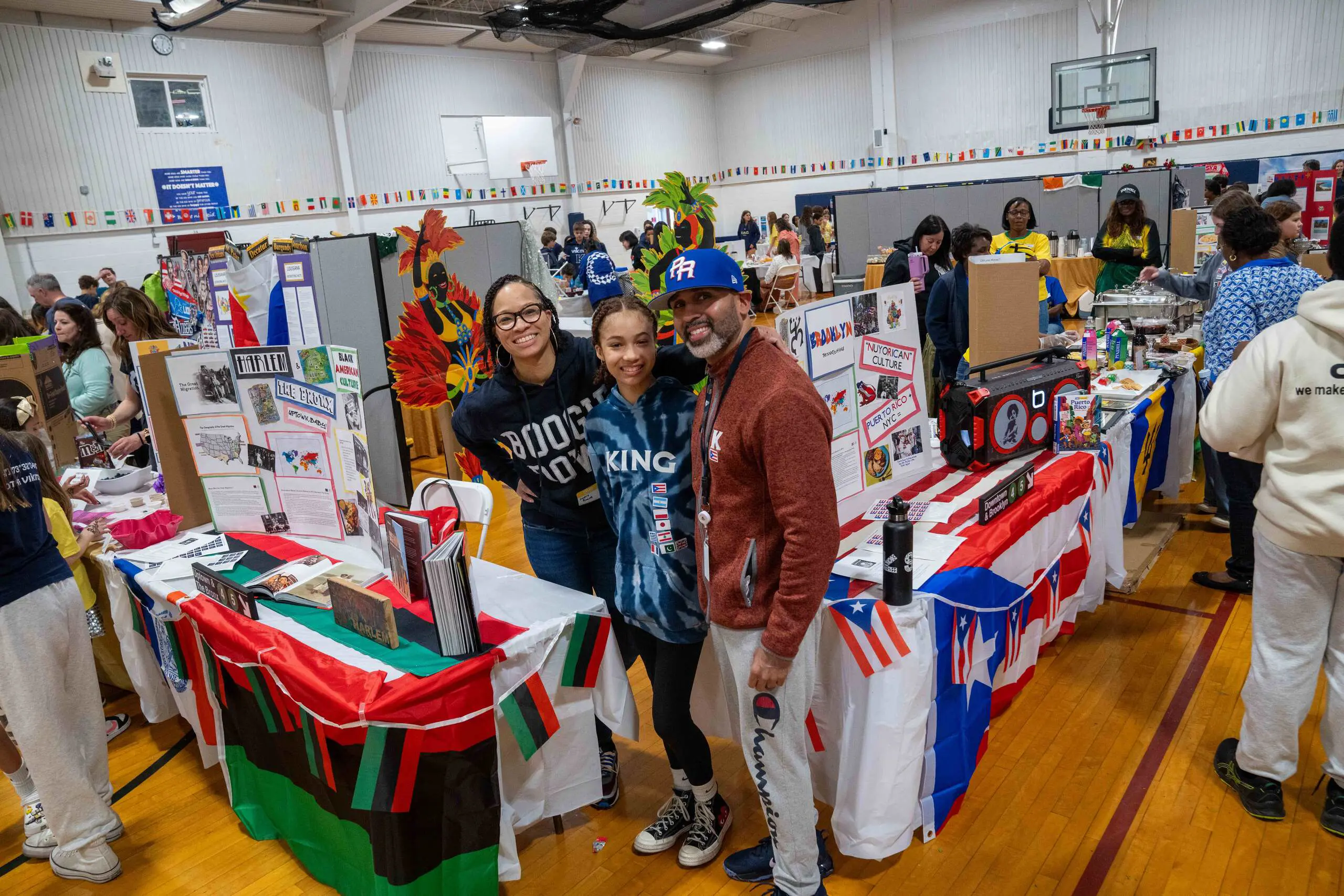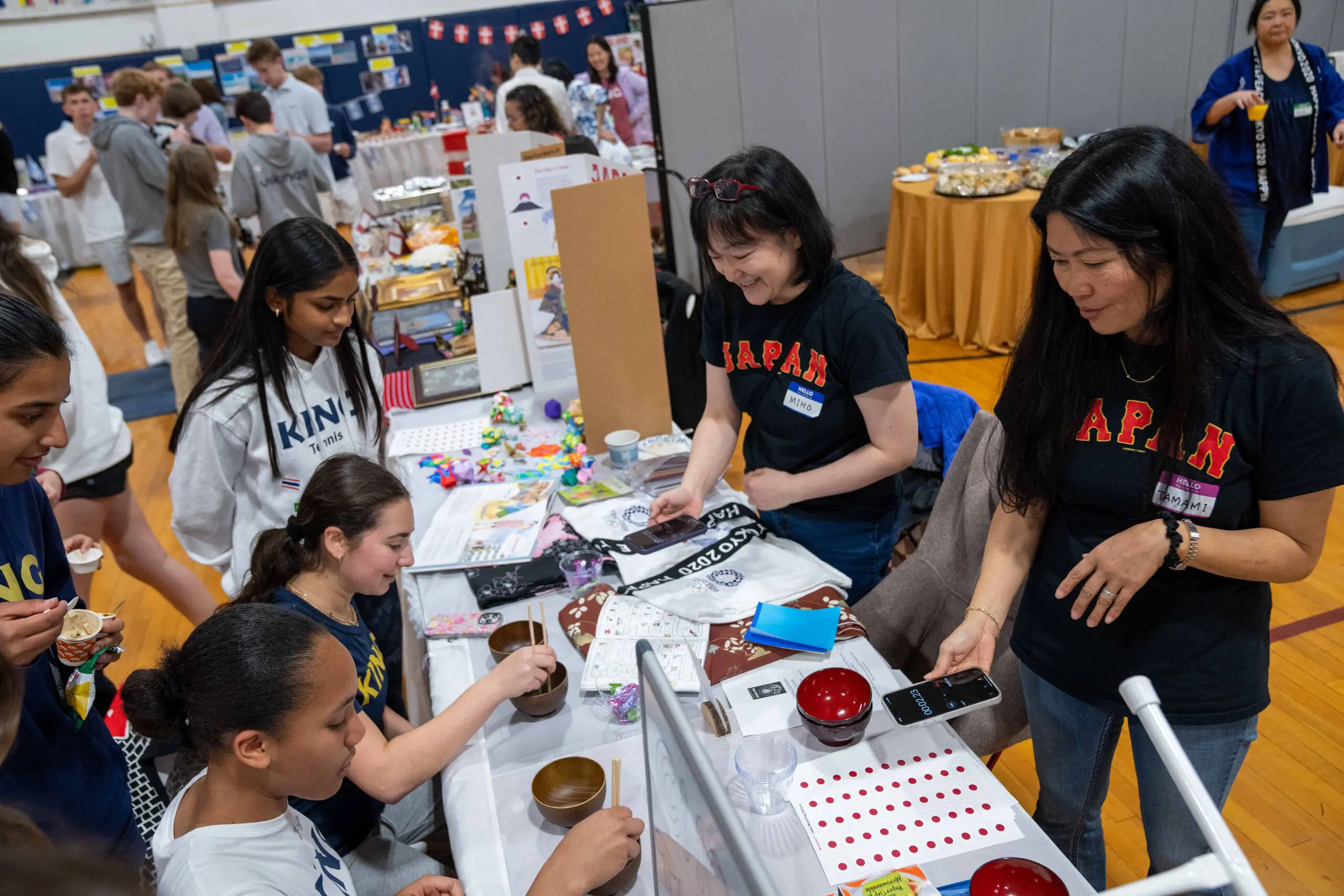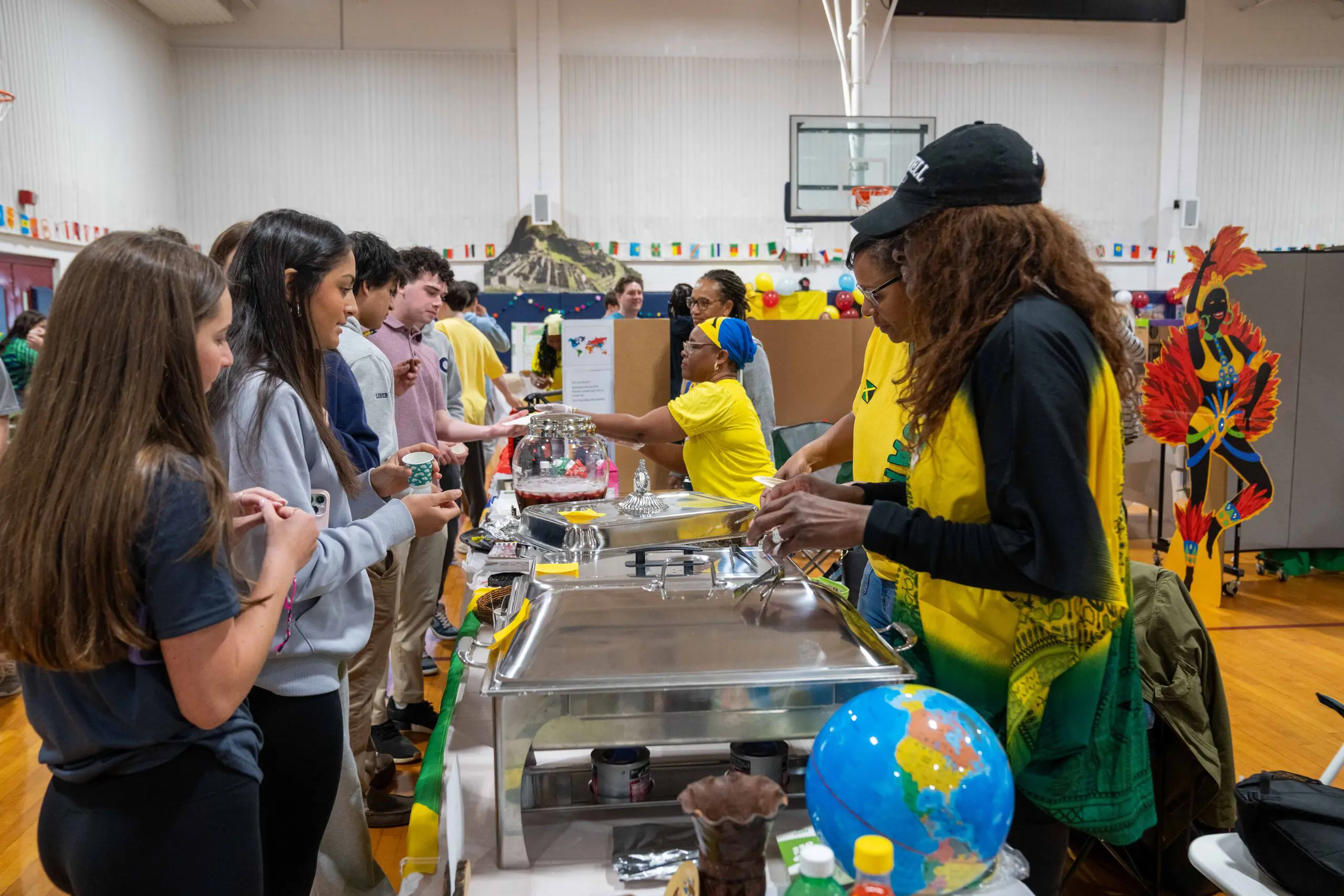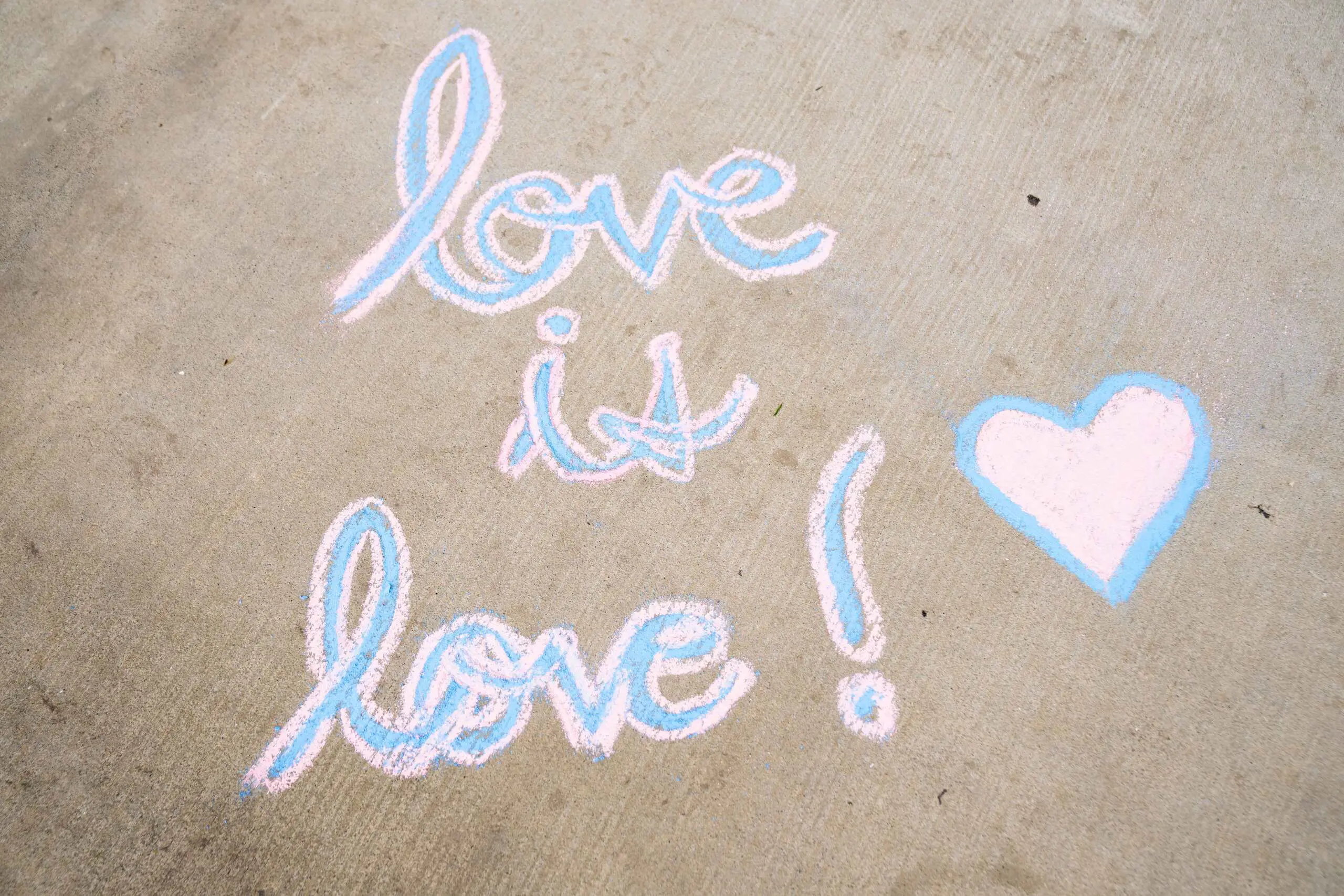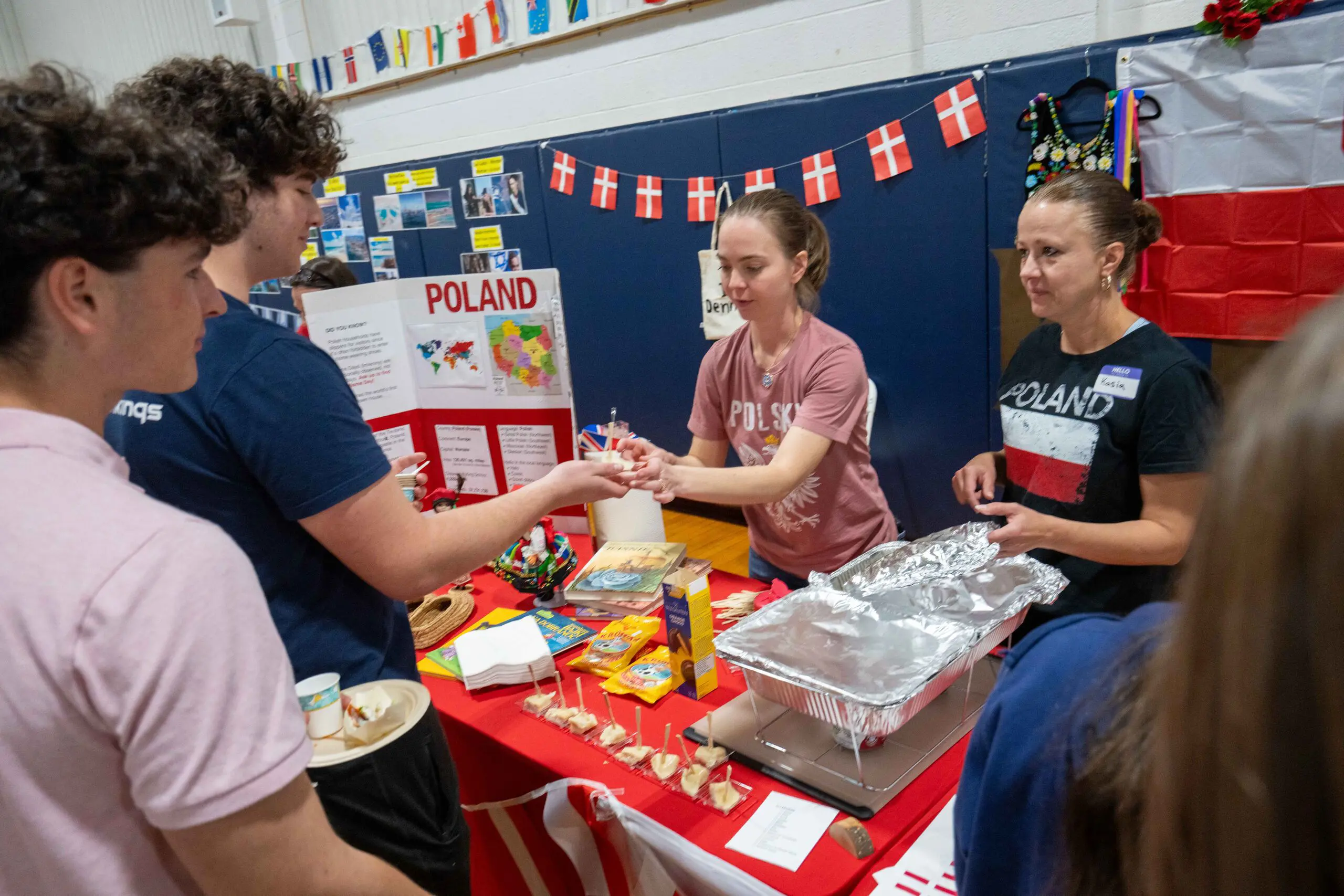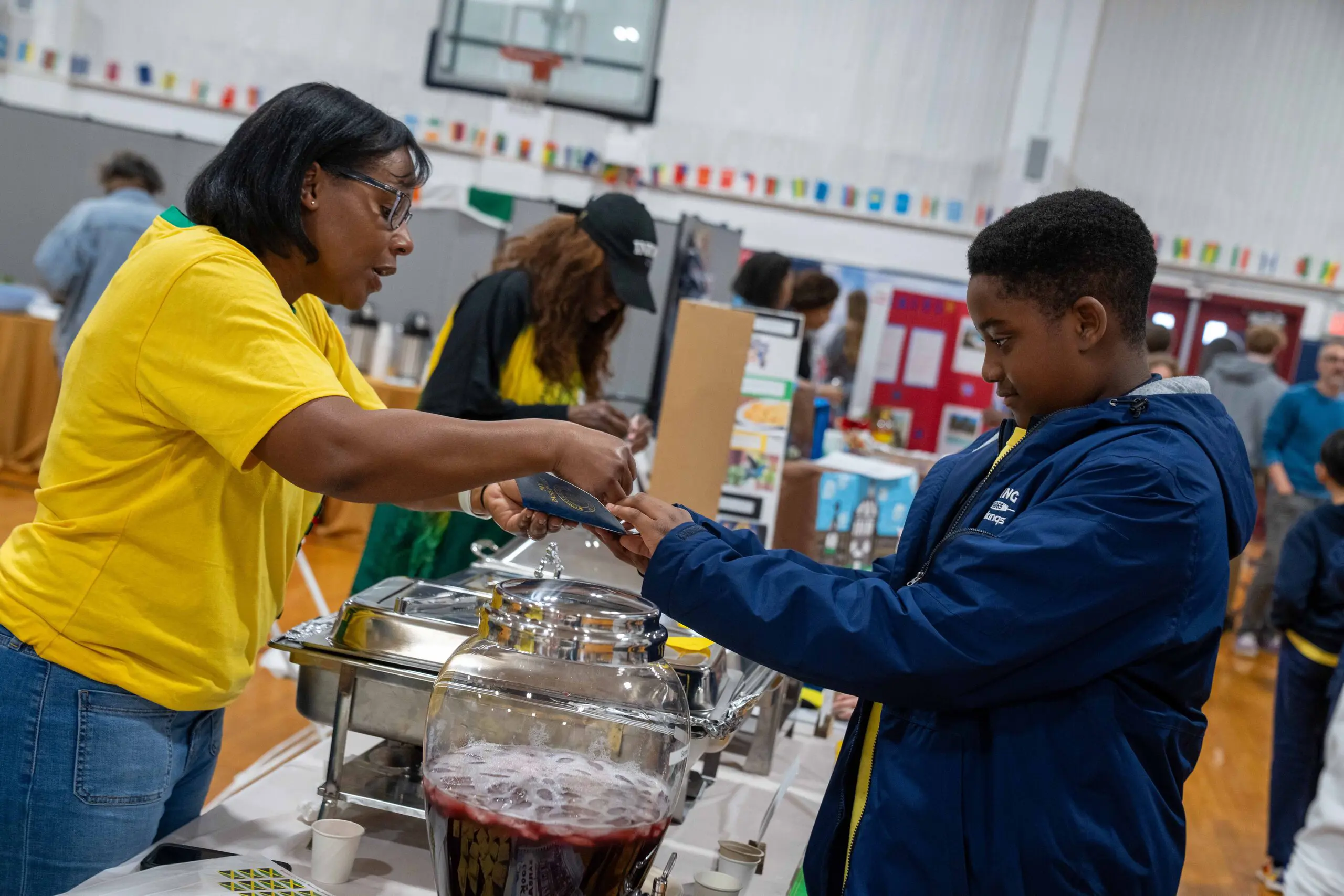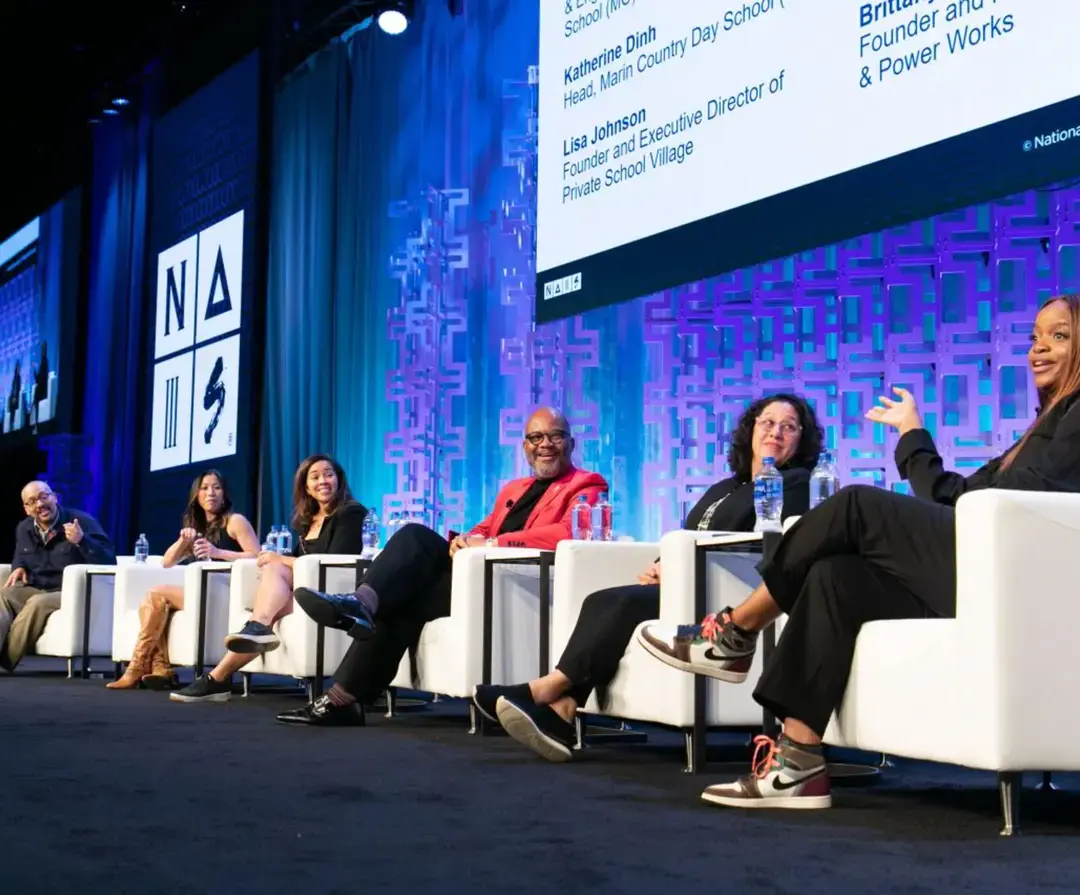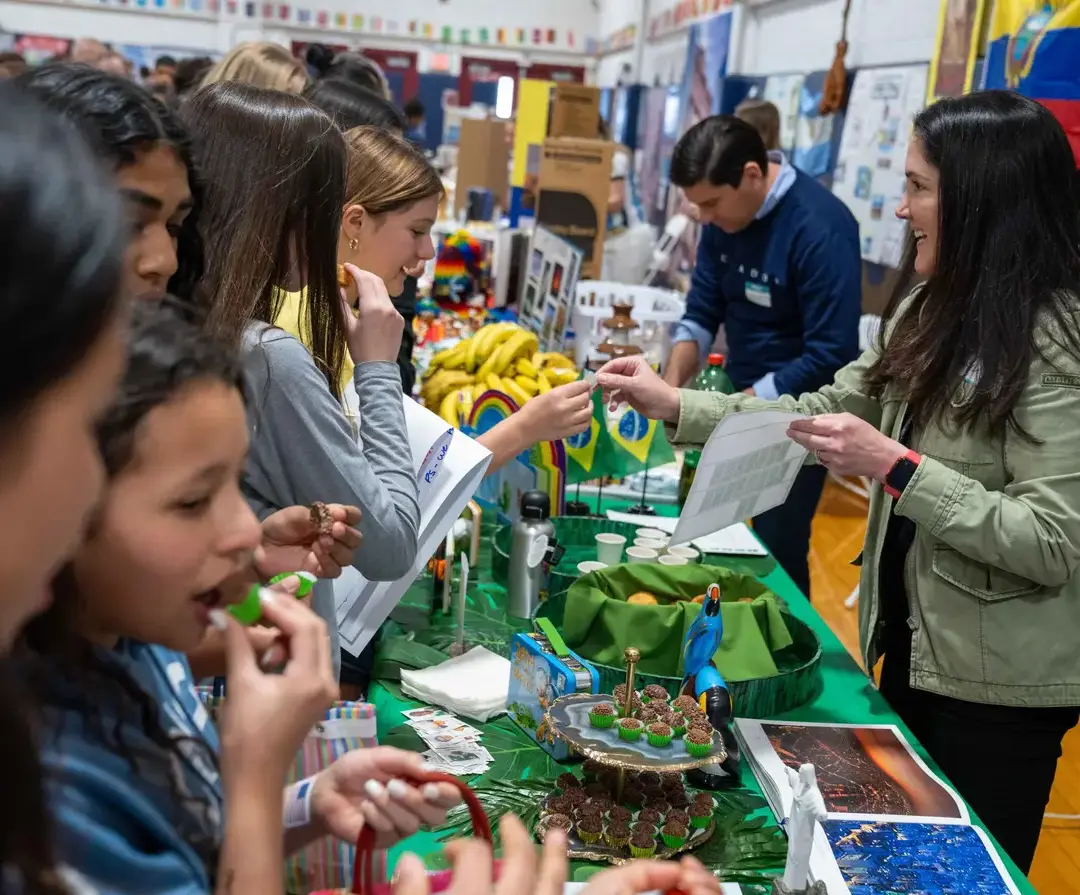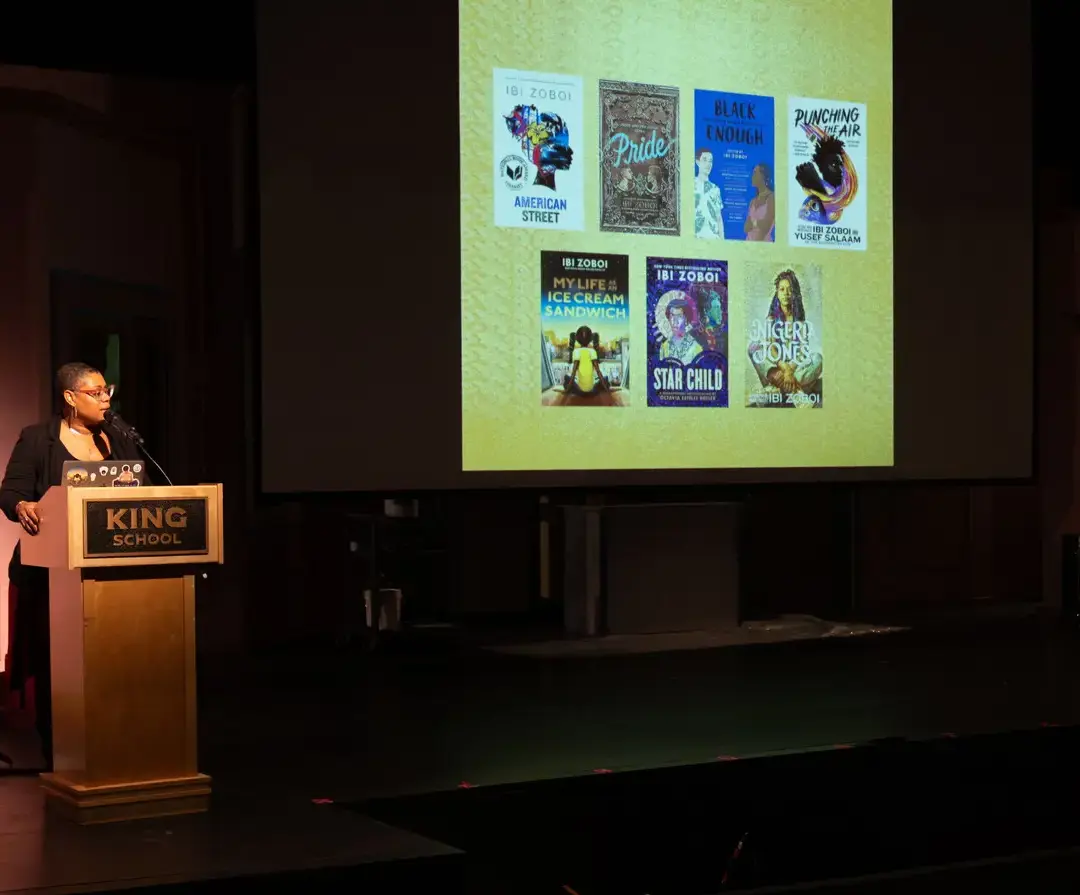The Power of BELONGING
Together, we celebrate everyone's uniqueness.
Diversity, Equity, Inclusion, and Belonging at King School is integrated into every area of school life.
Ensuring that every member of the community enjoys a sense of belonging is paramount to the school’s mission and aligned with its virtues of Integrity, Kindness, Perseverance, and Respect.
At King, we are empowered by our diverse talents and inspired by our different backgrounds and perspectives. In our diverse and inclusive environment, children as well as adults learn from one another and create a stronger community.
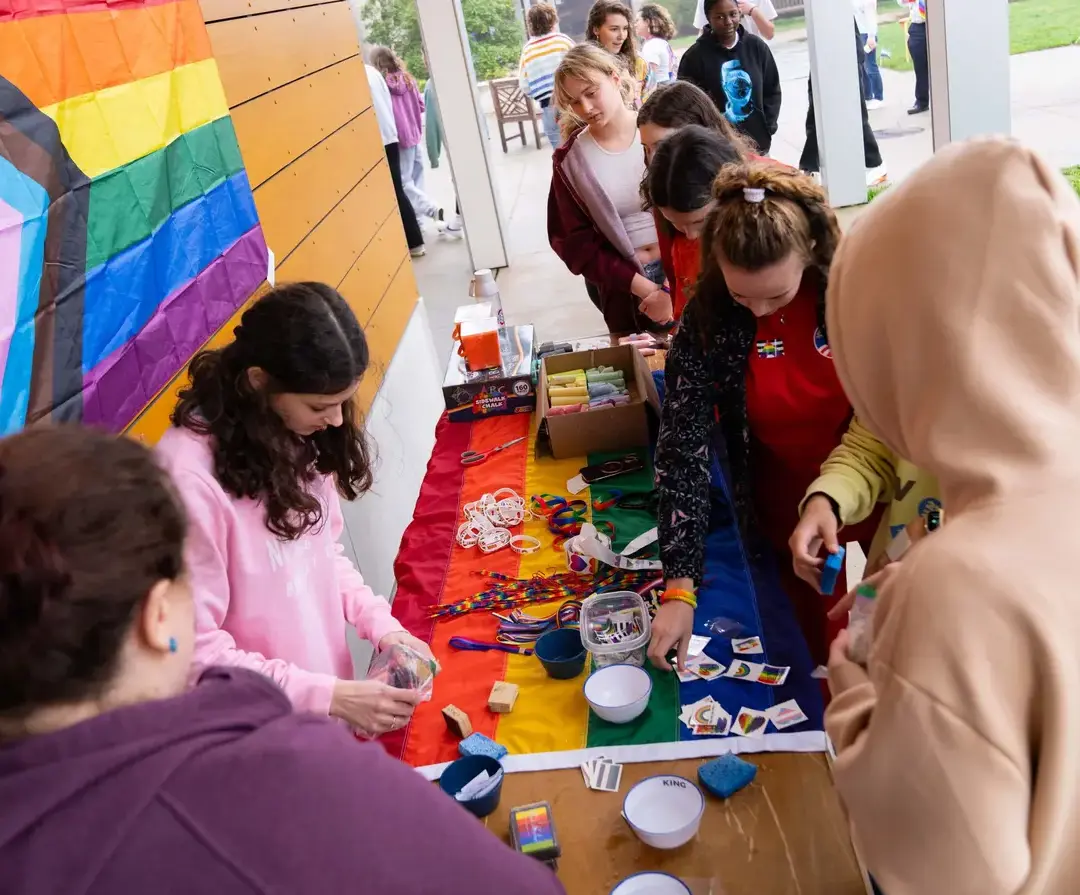
Students and faculty come from 40 neighboring communities and over 70 countries and engage in an expansive curriculum that spurs conversation on culture, religion, ethnicity, and lived experiences. |
King School's Commitment to Diversity, Equity, Inclusion, and Belonging
King School's commitment to Diversity, Equity, Inclusion, and Belonging is a collective endeavor that is integral to the school's culture, educational philosophy, and dedication to excellence.
Our goal is unwavering: to empower our students to find their voice and respect the voice of others.
We work to build a welcoming community inclusive of diverse backgrounds and perspectives. Harnessing the power of our similarities and differences, we pave the way for mutual understanding and joyful connection. We build bridges and help shape engaged global citizens who are ready to thrive at King and beyond.
Inspired by our mission and virtues, we challenge stereotypes and promote equitable experiences to ensure that every person in our community feels seen, heard, and valued – so that every story finds its space.
Recognizing the complexities of this journey, we commit to continually learn and improve.
At King, we are enriched through our appreciation of diversity’s many faces, including gender, race, religion, ethnicity, family makeup, sexual orientation, socioeconomic status, physical ability, geographic background, viewpoints, citizenship status, learning style, and age.
Meet the DEIB Team
The DEIB team at King School is composed of a director as well as divisional and departmental coordinators.
The team works in every area of the school and offers guidance and support to ensure that the King School curriculum, pedagogy, recruiting, retention, and school culture are a reflection of our commitment to diversity, equity, and inclusion. The goal is to educate, engage, and empower our community members.
|
Clyde Beverly |
Jennifer Guevara |
Sara O'Toole |
|
Lindsay Stone |
Lindsey Rossler |
Lakeya Newton |
|
Asante Robinson |
“Diversity is a fact. Equity is a choice. Inclusion is an action. Belonging is an outcome.”
Arthur Chan
All-School Integration of DEIB
| DEIB Definitions |
|---|
|
Diversity We acknowledge, recognize, and celebrate the different identities within our community that may include (but not limited to) race, gender, religion, sexual orientation, ethnicity, nationality, socioeconomic status, language, (dis)ability, age, religious commitment, or political perspective. Equity We seek to engage in fair and just practices to provide the necessary support and resources needed for all members of our community to thrive. Inclusion We seek to ensure all members of our community are seen and heard. Everyone is “invited” and provided equal access to resources. Belonging Moving beyond inclusion, belonging is a “feeling.” We seek to create a school environment where all members feel safe, supported, celebrated, and affirmed. Equality Simply ensuring each member of the community is provided with equal access and opportunities. Cultural Competency An appreciation and respect for the values, attitudes, beliefs, and practices of individuals from different cultural backgrounds is expressed/conveyed/evident in our commitment to learn, communicate, and create safe spaces for individuals to explore aspects of their culture and others in the classroom and beyond. Justice Removing and dismantling any barriers preventing any members of our community from having full access to resources and opportunities at King. Racial Literacy Developing the knowledge, awareness, and skills to discuss topics around race and racism in an age/grade-level appropriate way. |
| Governance |
|
The Board of Trustees recognizes the importance of diversity, equity, inclusion, and belonging as a guiding principle behind our mission. This priority is reflected as one of the pillars of our Strategic Plan that reinforces our commitment to being an inclusive institution. This goal requires us to respond appropriately to the needs of our community and to create a learning environment where students are challenged to think critically, act respectfully, and consider multiple perspectives in their academic journey at King. Crucial to the proper oversight of King’s DEIB goals is the Board’s own education and the competencies of its trustees. To that end, members of the Board participate in regular DEIB training sessions. The Board has a standing DEIB Board committee that is tasked with the oversight of King School’s policies, initiatives, and strategic goals related to diversity, equity, inclusion, and belonging. The committee helps guide the Board's own work in this space and address any organizational gaps in mission fulfillment and strategic vision. The Board understands the value of diverse backgrounds and perspectives at the Board level and has proactively increased diversity among its members. |
| Culture |
|
At King School, we believe that every member of our community should enjoy a sense of belonging. With the goal of improving our cross-cultural competencies in classrooms, on the athletic fields, and within our co-curricular activities, our students, faculty, and staff participate in workshops, training sessions, and educational opportunities during the academic year to learn to identify implicit biases and systemic racism in our curriculum and our approaches to teaching, counseling, advising, and coaching. In order to foster belonging and provide a space to discuss shared experiences, middle school and upper school students have access to age-appropriate affinity groups. These groups were formed following the recommendations made by students, and they have become a central component of our work together. With the help and support of student openness, bravery, and vulnerability, affinity groups meet regularly during lunchtime and are facilitated by trained faculty and staff. We will keep listening to our students and will create new groups as needed. An Employee of Color Resource Group is available for our faculty and staff. This group is a space for participants to explore their identities and share their personal experiences. Employee Resource Groups, or ERGs, are voluntary, employee-led groups that foster a diverse, inclusive workplace aligned with organizational mission, values, goals, business practices, and objectives. Our goal is to create additional groups that meet the needs of our community. We must hold each other accountable when it comes to fostering a safe, welcoming, and inclusive school. Discriminatory behavior is not tolerated in our community. King School has a robust nondiscrimination policy and reporting system, and established reporting mechanisms. The school swiftly addresses allegations of racism, discrimination, or unwelcome behavior.
DEIB Clubs and OrganizationsMiddle School Affinity Groups
|
| Curriculum |
|
A foundation for academic excellence is an education that includes a diversity of voices, backgrounds, and experiences. Our Prekindergarten to Grade 12 curriculum is reviewed and updated regularly to ensure that all subject matters and disciplines are taught through a lens of equity and inclusion. Our goal to improve racial literacy, cultural competencies, and equity practices is ongoing. Our curriculum aims to build greater self-awareness and achieve grade-level programmatic goals that reflect multicultural perspectives. Academic departments work to incorporate cross-cultural competencies directly into the curriculum as well as to develop a research-driven curriculum that reflects inclusive academic excellence. In addition to an inclusive curriculum, we are continuously working to make our classroom libraries more diverse and culturally responsive. Our teachers are trained to identify, address and interrupt biases and microaggressions on campus. |
| Human Resources, Recruitment, and Retention |
|
A central component of a fully integrated DEIB approach is analyzing diversity and representation among our faculty and staff. In order to address this, a very intentional approach has been taken to examine our hiring practices. We strive to create a diverse community not only among our student body but also among our faculty and staff. In order to do so, we have recruiting and hiring processes in place to increase the presence of underrepresented groups in all areas of the school. To increase diversity among our faculty and staff, we attend job fairs focused on recruiting candidates with a variety of experiences and backgrounds, and we work with recruitment and search firms with a demonstrated commitment to representing candidates of color and candidates with skills in cross-cultural competence. We are advertising our job openings in a broader range of spaces such as social media, job fairs, colleges and universities, and associations beyond independent school arenas in order to open up the door of access. We require members of hiring committees to go through “bias-aware” training to ensure that we are looking at candidates through an inclusive lens. Our hiring process helps us ensure that we mitigate bias and inequity during the process of attracting and reviewing applicants. During the interview process, a member of the DEIB team meets with potential candidates to assess alignment with King’s mission and virtues. We place a specific focus on faculty, counselors, and other staff who provide social-emotional and cognitive learning frameworks for underrepresented students. Our students and their families also have access to a diverse group of school counselors. Recruitment Partners
|
| Faculty and Staff Professional Development |
|
Our faculty and staff regularly engage in PGD to increase knowledge, awareness, and skills and better incorporate DEIB in academic settings. Our lower school faculty has been working collaboratively with consultants to create more culturally responsive classrooms and continue to foster a sense of community and belonging. This work has been implemented in their curriculum and was presented recently at the National Association of Independent Schools (NAIS) People of Color Conference (PoCC) this past year.
Our staff has engaged in PGD to gain a better understanding of how identity and world lenses can impact our engagement and communication with others. This work also extends to our coaching staff who also participates in PGD to better promote inclusivity within their sports teams and locker rooms.
|
| Community Engagement |
|
In addition to offering educational initiatives to students, faculty, and staff, King School also provides opportunities to parents, alumni, and the greater community. The Office of Diversity, Equity, Inclusion, and Belonging in partnership with the Parents' Association's King Inclusion and Diversity Committee (KInD), organizes activities for families, including author visits, speaker series, and training for volunteers. The mission the KInD Committee is to help foster a welcoming space for King parents and our entire school community through inclusion and celebration of diversity. The PA leadership (Executive Board, Class Parents, etc.) engages in training each year to make sure they are guiding the families within our community in a way that is fully aligned with the mission and virtues of King School. In addition to this work, the PA KInD Committee plans events that celebrate the wide range of diversity within the school community. Examples of KInD Committee-sponsored events include The Winter Festival of Lights, Book Club, PA Speaker Series, and Global Fair.
We understand that to truly become an inclusive institution, we must also engage our extended community. We are fortunate to be located in a relatively diverse area of Fairfield County, which allows us to take advantage of many resources. We form partnerships with organizations that allow us to engage in a dynamic exchange of thoughts and ideas between our communities. |
| Community Partnerships |
|
Along with the work we do within our school community, King School extends our virtues beyond campus through community partnerships. Some examples of these partnerships include:
Every year, King School students, faculty and staff, and the leadership of the school attend conferences and participate in professional development opportunities specifically focused on DEI work. Some of the conferences we attend are listed below.
|
| Admission |
|
The Admission and Financial Access team also works to attract and enroll a diverse student body. Members of the team form strategic partnerships and attend conferences and workshops in order to strengthen our ability to build a more racially diverse student community. In addition to our commitment to a more racially diverse student body, we continue to provide significant financial access to students, ensuring a socio-economically diverse population. With respect to the admissions process, the DEIB Director sits on the admissions committee of all three divisions. Similarly to the hiring process, these committees have discussions around any biases that may come into play when reviewing applications. |
Highlights of DEIB
| Lower School |
|---|
|
In the Lower School, DEIB is woven into the curriculum at each grade level, as well as specialist classes. Students engage in lessons, activities, and projects around identity and community, with King’s virtues serving as the backdrop for every experience. Developing an understanding of self and the various communities we belong to physically and online, students grow in their self-awareness, self-confidence, empathy, and appreciation for others. Literature is utilized across the grades to provide windows and mirrors for students to support their learning and growth. Cultural assemblies and recognition of events that occur throughout the year also broaden and deepen students’ cultural schema. Examples of Grade Level work this year include:
|
| Middle School |
|
In the Middle School, DEIB is incorporated into both the curriculum and advisory. In the Advisory Program, students and their advisors engage in lessons about identity, heritage, character development, and community. They learn through hands-on projects and guided discussions. There are also division-wide programs and talks with guest speakers that provide supplemental support to help educate and empower our students. Examples of DEIB programming/activities in the Middle School include:
|
| Upper School |
|
In the Upper School, students are encouraged to engage in DEIB work in a variety of ways. With guidance and support from faculty and administrators, students lead club, class, and division-wide programs and talks to educate and empower members of the King community. Faculty encourage students to be leaders in the DEIB space whenever possible and learn to advocate for issues about which they are passionate. The upper school is committed to opportunities to learn together as faculty, staff, and students and grow in our empathy, understanding, acceptance, and commitment to one another. Examples of DEIB programming/activities in the Upper School include:
Student leaders went to the Middle School to discuss language and how we treat one another |
| Athletics |
|
From an athletic perspective, we focus on using a proactive and holistic approach to engage, inspire, and motivate the thought process and actions of our student-athletes. We work across the Middle and Upper School to create a synergy in Athletics. With the support of our athletic administrators, we create a safe space that allows for deep dives and discussions based on shared experiences and educational opportunities. Not only do our student-athletes participate, but our coaches also join the action through workshops and training sessions. Our programming is developed through recommendations from our student-athletes, coaches, and peers on the DEIB team. Also, we have and will continue to recruit guest speakers that assist in providing a ‘toolbox’ for our players and coaches. Examples of DEIB programming/activities in the Athletic Department include:
As previously stated, we take a fully integrative approach to DEIB at King School, and we hope these few examples illustrate what we mean when we say that. It is at the core of who we are as an institution and fully aligned with our mission and virtues. We will strive to continue to make progress in this area, as it is essential to creating the type of optimal learning environment we seek to offer at King School. |
This feature is private please log in to see the content.

